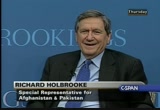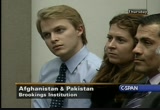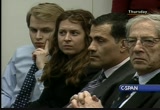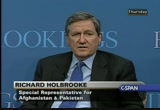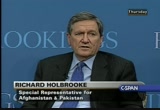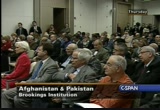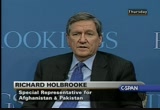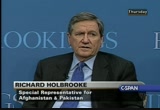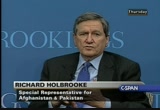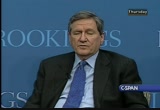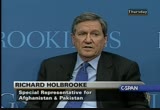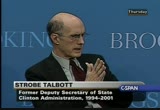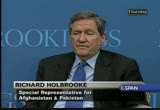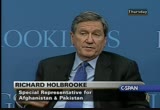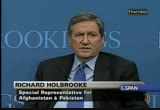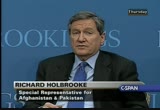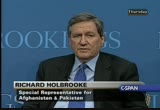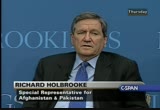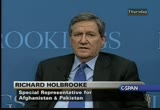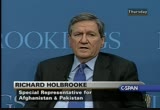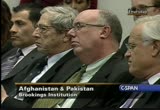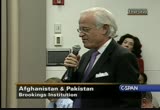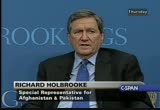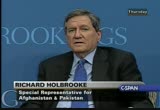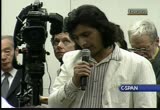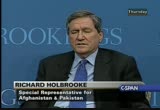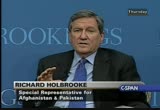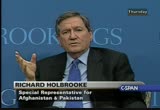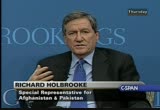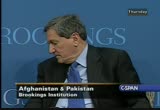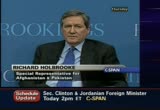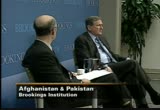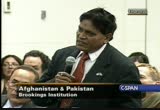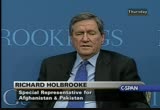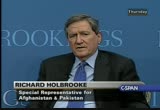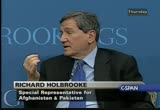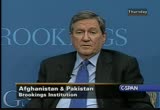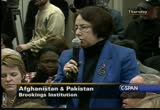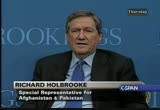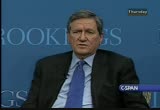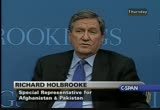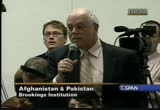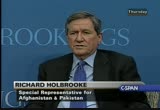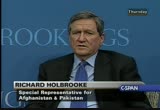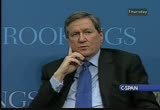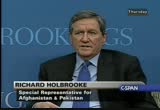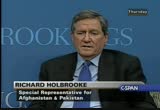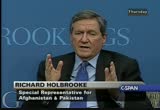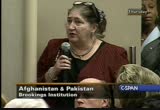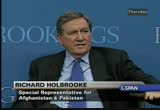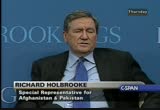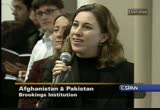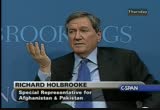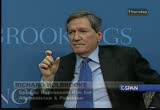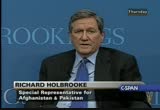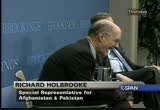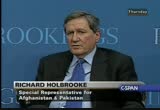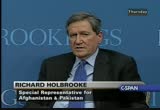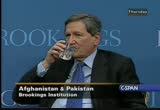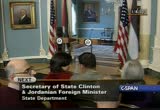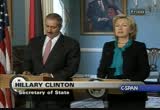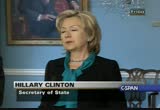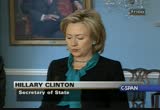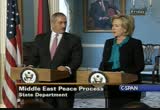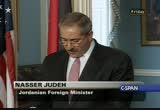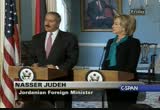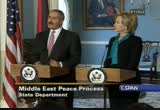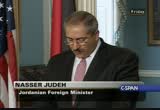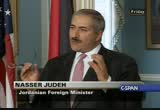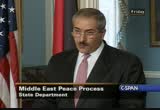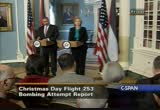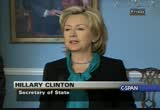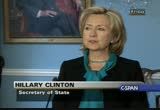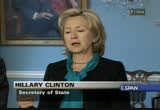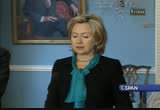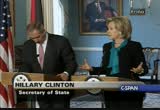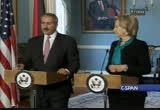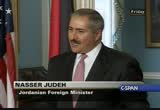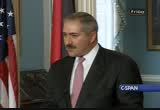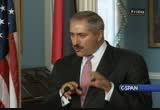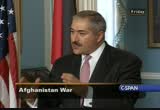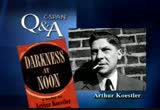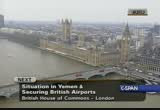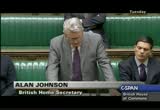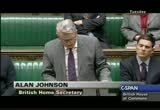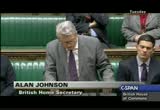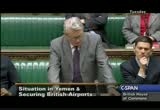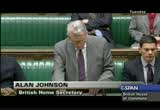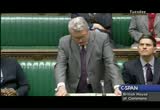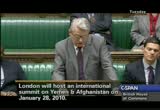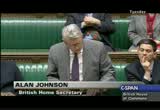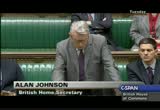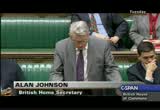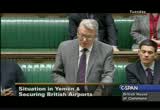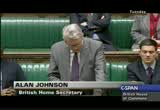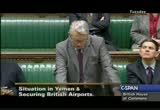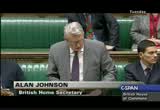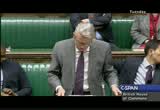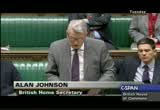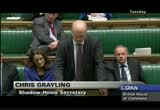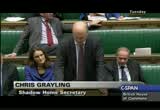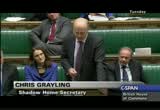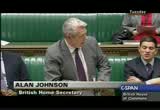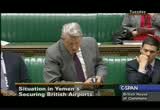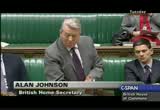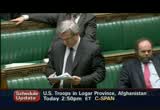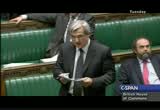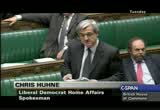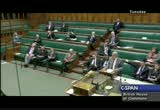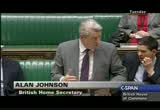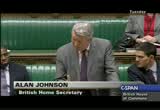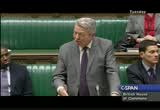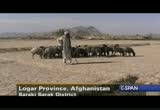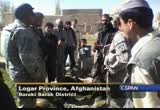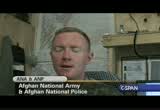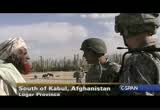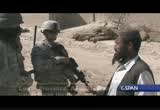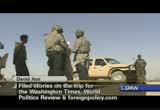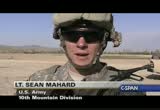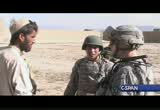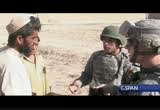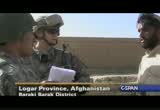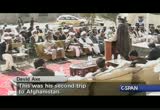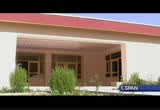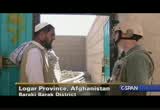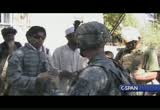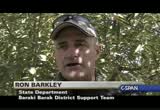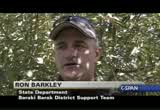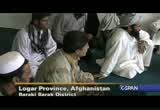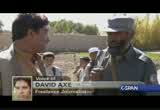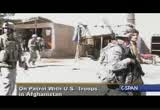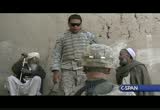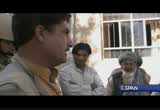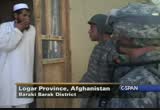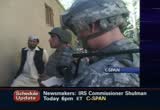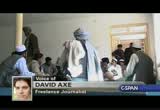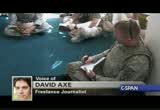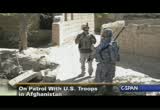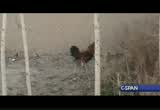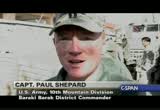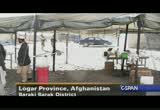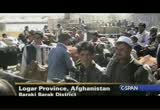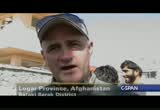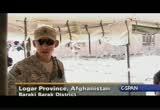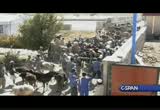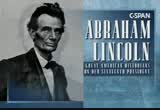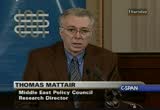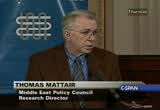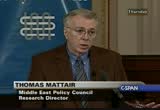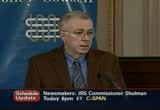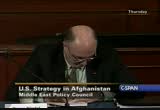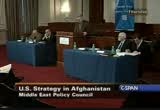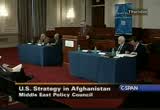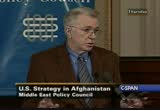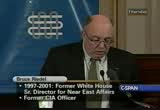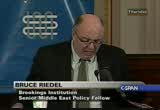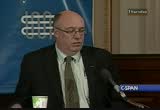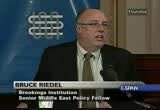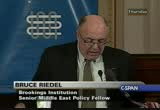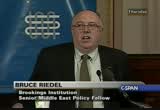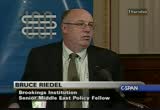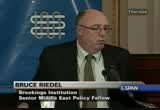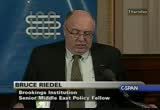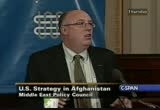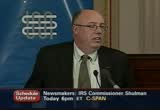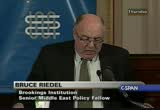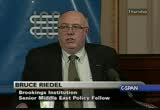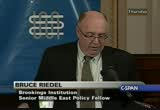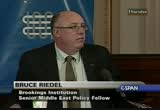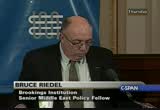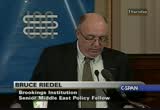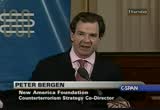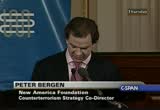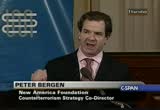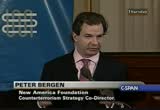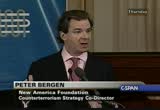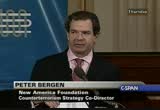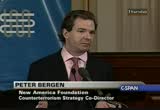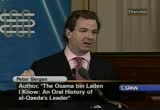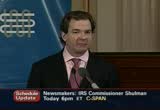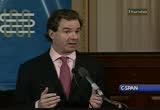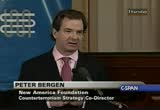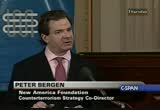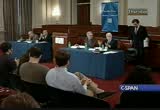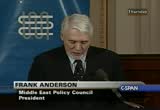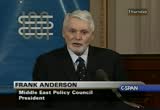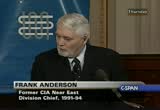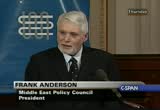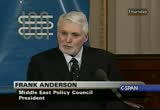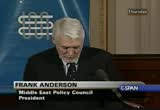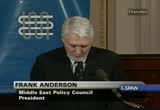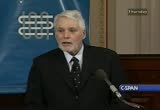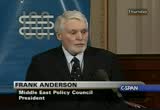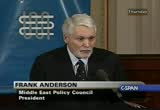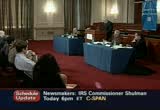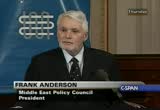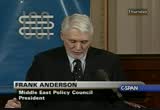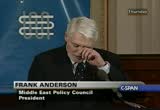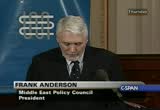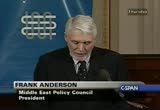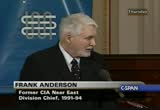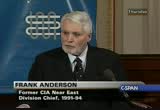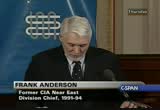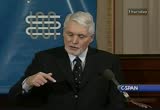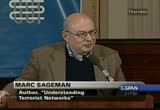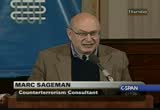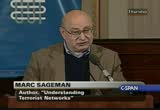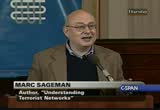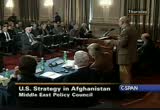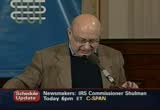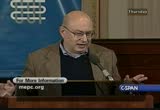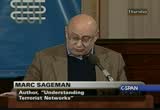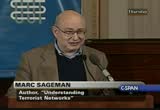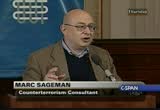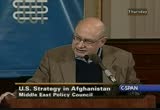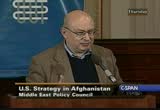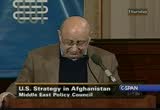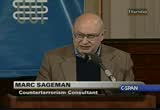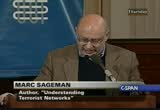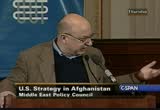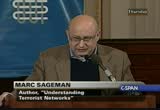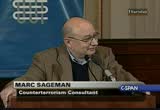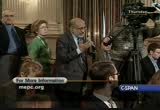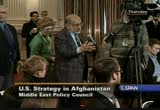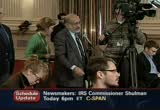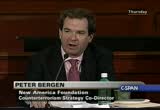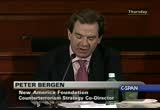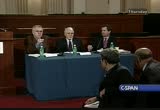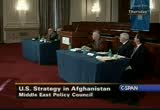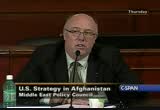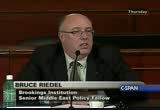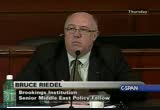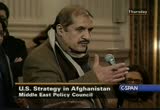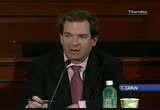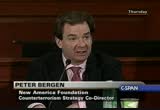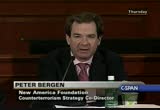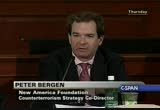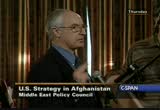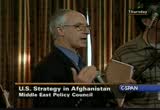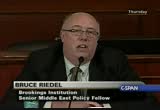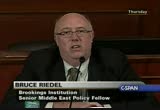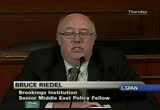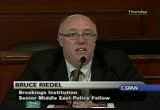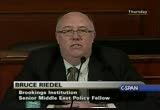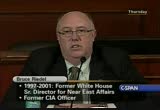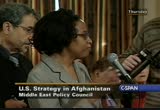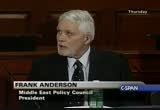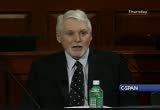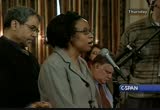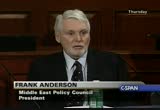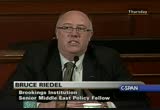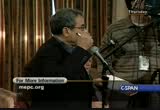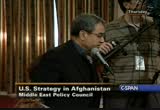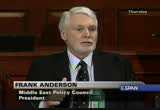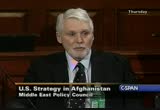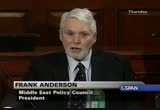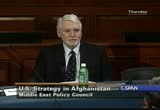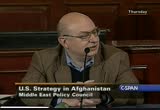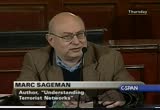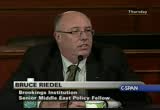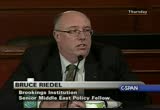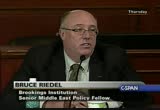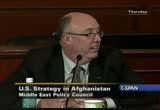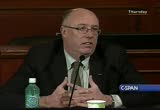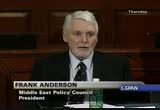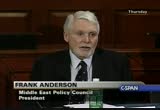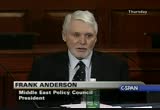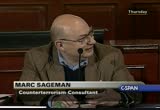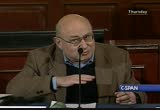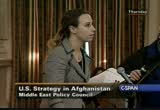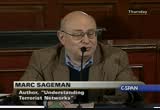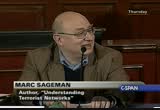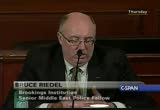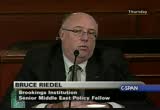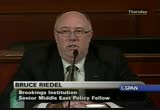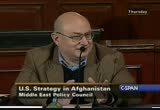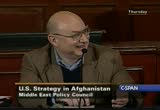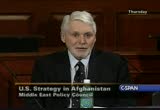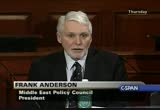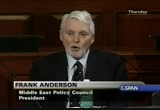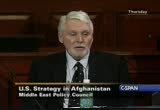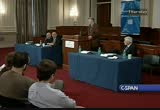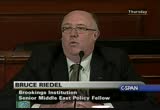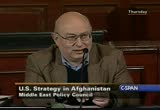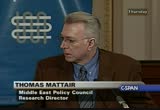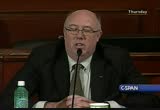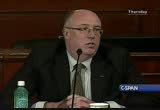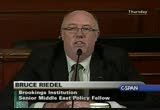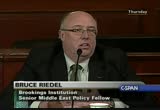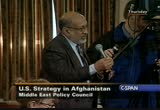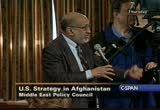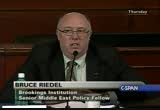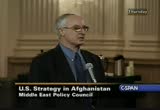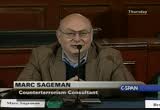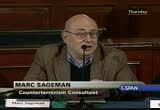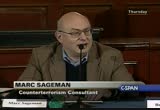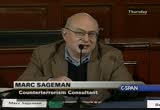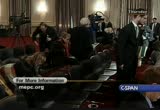tv C-SPAN Weekend CSPAN January 10, 2010 1:00pm-6:00pm EST
1:00 pm
intense interrogatories style. i see in the audience so many friends of mine for some years and i'm grateful to see wall. i want to it knowledge stan the my first met in the johnson administration when he was secretary of the army. he is a great figure and america's national security history. in terms of people i work with i want it knowledge and the others. on my own team -- i should mention on both wall there in the short without a jacket is roman, our ngo average person. we are the only office in the building but there are literally 1000 ngo's operating in pakistan and afghanistan. there was no road map.
1:01 pm
ronan is doing cross-hatched computerization and we are systematically reaching out. wat is toer huge issue in both countries. he will be able to tell us which ngo's in the u.s. work on water. next to him, ashley who has been with me now for a decade. . . boomer, who's been with me now for a decade. and has been in the current capacity a specializing on the all important issue of communications and counterpropaganda. this war is a war of information. and it is always been most extraordinary to me the that area is where the world's most -- the world's leading communication nation, the united states, has been at least until recently outcommunicated by mass murdered living in the most remote areas of afghanistan and pakistan. and we have to take the public
1:02 pm
information space back from the enemy in order to succeed. and ashley is pioneered such creative ideas as using cell phone technology and such obviously ideas as countering their abuse of low wattage fm station to say terrible lies. next to her, is valley nee 15. he came to us from and has just written another one of the wonderful books. he was working on pakistan for us and not on iran, since that always appeared in the blogs inaccurately. i think we are missing someone. tim who came to us from afghanistan. a representing the future of the
1:03 pm
foreign service. we have a whole lot of other people in the back there, including in the department, from nine other agent sis plus the state department. strobe, what i'd like to say, the most common question i get in when i walk down the street or run into people is the most valid. why are we in afghanistan? that's a fair question to ask in a situation as complicated and difficult as this. this is not an easy situation. a year ago barack obama inherited the situation. and he faced several choices. so we went through a complicated policy review. which some of you in this room contributed to. and one person this this room led, bruce riedel. he was the chair and i was the
1:04 pm
cochair. and i thank bruce again here in the front row. i thank bruce again for his response to president obama's call which came on the third day of the administration. and bruce gave us 60 days. i thank strobe for lending him to us. and we concluded quite simply that america's basic national security interest were at stake in these two countries. this was not enough where the vietnam posed no direct threat to the american homeland. it was not iraq, where saddam hussein had attacks on our countries, including pakistan itself has been planned. the people out there said they would do it again, very clearly, as the near miss on christmas day demonstrates. in fact, this particular person was not trained, and pakistan
1:05 pm
does not change the fact that the inspiration for all of this comes from al qaeda and al qaeda's leadership is based in the remotest areas on the afghanistan/pakistan border. so we concluded without any dissent that this was a national security issue. we could not walk away from it. the second question was therefore, what do we do about it? the answer has been laid out in a serious of speeches and public states by president obama march 27th and december of last year were the two major statements. but there's been many others. i've been out there saying, the military has, hillary clinton, bob gates, vice president biden. the press reported special discussions in which people put forward a variety of views both in february, march, and again in the extraordinary intense policy review process which i participated in august which
1:06 pm
came to culmination. so let me be very clear on this. having served every democrat president from washington during the white house in the senior state department. it is when you don't have discussions of a range of options in the room that you should ask questions. and it was to the enormous credit of this administration and to president obama that every view that y'all in this room are likely to hold was put forward inside the windowless room in the basement of the white house. so the president had the full range of views as he set forward first in march and february to send 21,000 troops, including 4,000 training troops. and then in december when he allowanced -- announced 40,000 more. it is the part the press is focused on. it's not the part i'm directly responsible for. i made inpotents that
1:07 pm
discussion. but our job is the civilian side of the war. from communications to agricultural from rule of law to subnational governance. to education and health. and that's what we do. plus the diplomatic side of things. i want to underscore that we are there because our national interest are at stake. we know how difficult it is. and our allies in the region now how difficult it is. i have toured now every single country in the region even and outside the region that might be affected expect your three favorite, turkmenistan, tay vehicle stan, and which i will go in the next month. without exception, every country agrees on what's happening in afghanistan is a direct vital strategic interest to them as well. i need to underscore that from
1:08 pm
beijing to moscow and abu dhabi and including all of the states in the gcc all agree that stability in afghanistan and pakistan is critical in a strategic sense. so we conclude as well that what happens there is not just vital to our own homeland security, it's also vital to an extraordinary large range of countries which includes the two most populous countries in the world, it includes russia and the world's largest oil areas, and a whole range of other issues. and there are obviously implications for other problems we face to the east. and in iran and in regard to the arab israeli issues. so the 30,000 troops that
1:09 pm
started to deploy, on the civilian side, we build up rapidly last year. i want to underscore again on behalf of the department of state and secretary of state that when we came in office, there were 300 civilians. not a lot, considering the importance of the country. when i was ambassador of germany, there were 2500 people. we had 300 civilians in afghanistan. we tripled it last year. and that growth will continue as the troops build up. we are working out the details now. we're working closely with deputy secretary of state jack jack lew. there will be a big build up. the new administrator is being sworn in. and he and i are already collaborates. we will have a press conference after this joined by tom
1:10 pm
vilsack, the secretary of agriculture. why agriculture? because it's the most important nonsecurity program. tom vilsack will be leave shortly. exact time withheld for security reasons. i hope you'll respect that. to further or very ambitious goals to help afghanistan. so we have a vast array of civilian programs. we have an expanding dialogue on international diplomacy. i got back late last night from london where we spent the day in pentagon working out the details after forthcoming conference at the end of january on the international components. now i don't know, strobe, if i fully addressed your question. since time is limited, i'd like to go where you and your audience would like to take us. i do want to stress that we
1:11 pm
really are committed to a successful outcome here. our international security is clearly at stake. >> thank you, richard. i think i'll put two questions to you and open it up to the group. one has to do with the mid 2011 deadline. how we should understand that? what is means in practical terms? the second is about pakistan. you eluded to it here and stressed it in the past, the importance of pakistan peace of your assignment. mike and several of his colleagues had the latest in the "new york times" other the weekend, which the bottom line the situation is worst off there both in terms of the welfare of the pakistani people and also in terms of our interest. maybe you can give us your own
1:12 pm
assessment on that? >> the president announced we would add 30,000 troops. he also said that he would begin a withdraw of some of the combat troops in july of 2011. and later on in the speech, in a phrase that did not get adequate attention, he used the words a responsible transition of security responsibility to the afghan police and army. that is the key to the speech. that's the key to the policy. the domestic considerations are no secret to any of you. but i'm not going to comment on those. i'm here to represent our foreign policy, not our domestic political issues. but you are all aware of the controversies that of surround the policy. the president believes that the -- and by the way, there will be a review of all of this in december of this year. which he also mentioned this
1:13 pm
this speech. the president believes that we need to put more emphasis on afghanistan self-reliance and that in 18 months we need to show tangible, visible progress towards a transition for afghanistan taking over responsibility for the themselves. not across the country. i left for europe while the president was speaking on december 1. and landed in brussels after -- just after he spoke. and the europeans had been, of course, with the time difference they had not heard the speech. and the headlines misportrayed the speech right at the beginning. and said withdraw in 2011. but that was -- and that misunderstanding may have perpetuated here to some extent by people, either in innocence or deliberately misconstrued in the peach.
1:14 pm
some public speechers questioned it, but they misrepresented. the president made clear that we are not abandoning afghanistan. this is a strategy to work, create the time and space during which they can improve their own about for governance. that was discussed at length with president karzai and with his cabinet on numerous occasions, notably with the trip that hillary clinton and i had made to afghanistan on october 18 and 19 in conjunction with the inauguration. the afghans understood this, they are very comfortable with it. so i need to underscore that's what july 2011 means. not a withdraw, but the start of a responsibility transition in which american combat troops will begin to draw down. on the second question and in
1:15 pm
regard to pakistan, i'm not sure quite how you phrase it. strobe, you made a generic comment? >> mike hamlin and his colleagues have put together a set of bench marks on sort of how things are going. and the trend that they feel they have identified in pakistan is ominous, negative by comparison with a year ago. >> yeah. i read mike's monthly, it's quarterly, actually, isn't it? i read mike's quarterly table with great interest. and it@@@@@@p it's a common problem i've seen in every war i've been involved in. let's not confuse the number of
1:16 pm
cell phones with low the war is going. let's not minimize that cell phone penetration is a hugely important issue and a positive cater -- indicator for social and economic development in afghanistan, but it doesn't tell you how the war is going. pakistan. but it does not tell you how the war is going. i live through this in a distant war in another century and i'm very hard over on the fact that we often confuse input and output. i know you don't disagree with this. now back to strobe's question. how are we going in pakistan? it's a very come preindicated issue. i want to start by saying it's not how we are doing at all. this is their country. not our country. and the question is how is pakistan doing? and i've now been to pakistan six times, i think, last year.
1:17 pm
and at least, and i'm going back next week. all i can say that we knew from the beginning that what happened was important to the region. and we approaches pakistan with great respect for its sovereignty and territorial integrity and the enormous complexities of what it faces. economically, socially, politically, and strategyically on both of the major borders. and if you look at pakistan during the last year, you can construct two different models. but from our point of view, we saw the pakistani military go into swat, do great damage to the insurgence, collaborate and cooperate with the american military and some -- in some
1:18 pm
information sharing activities which produced beneficial results. but i want to underscore no american troops in pakistan. we do not do fighting in pakistan. and we -- and then they went into south wariristan. there was an enormous refugee problem. they led the response with hundreds of millions of dollars. we were the first out of the box. there was then a controversy of some of the requirements in pakistan. i think that was explained very
1:19 pm
well by secretary clinton during her trip. and the country went through some political dramas which were internal to pakistan, but which we watched with concern and sympathy. at the of end of the year, pakistan is in the position today with the united states looking for any way to support their government and their people. very heavy influence on the trip on supporting pakistan, on where the needs are greatest which are energy and water and other major economic issues. the largest muslim city had about 4 hours of the electricity of the day during the worst of the summer months. we want to do things to help address that problem. we've sent some of our very finest members of the
1:20 pm
administration out there, notably david lip pton to help work. on water, we're looking for more ways to help. water is not only a big problem, but you know it's going to be become and more and more serious problem. pakistan has a long and complicated history with the united states. which people like this, riedel have lived through. and we will continue to work with pakistan as a friend and an ally and with great understanding and support for the utter complexity of what they are going through. but i to in -- but i do not expect the core peoples of the question that the situation is worst today. the situation is what it is today, and not worse. pakistan is working it's way through a series of issues which
1:21 pm
are for them to decide on their own. >> thank you. we'll open it up. martin? and wait for the mic and identify yourself for the very few who don't know who you are. >> martin from the foreign policy program and brookings. ambassador holbrooke, india. some would say that unless you bring india into the picture and find a way to resolve the indian/pakistani differences as deep adds they are, it's going to be impossible to make progress in pakistan or afghanistan. i wonder how you would react to that. >> well, first of all, martin, i think everybody who knows the history knew certainly among them knows than india and pakistan have a unique interrelationship that goes back to the independence of the two
1:22 pm
countries. and we have to respect that. we can write books about it. but in the end, it is a fact of history. and we -- and my job does not include india. i'm a special representative for afghanistan and pakistan. there was a misunderstanding of this. i never sought to be the representative or on say for -- envoy of india. we have aeried wide range of relationships would not under any circumstances involve me. the secretary state for south and central asia, bob blake and our almost a year in new delhi does that. having said that, i keep the
1:23 pm
indians fully informed of my activities on a regular basis through the ambassador here in washington, she and i see each other frequently, and through recurring trips to india. everyone understands that india have a concern what happens. but i am not negotiating issues between i. ya and pakistan. that's not my job. nor is it something that would be productive if i were to undertake it. but i cannot stress highly enough that we -- that the indian relationship is important to the u.s., the pakistan relationship is important to the u.s. and there is -- and in my view, the argument that we favor one country over the other is a legacy of the past. i do not believe it is justified by the policies we are taking right now. :
1:24 pm
at the united states, through the government of eafing, is -- afghan, is there time for negotiation? recently there have been moodia reports that pakistan media is selectively targeting militants but not the ones this are upgrading in afghanistan. co - you say the remarks of the u.n. ambassador, did you say? >> yes. >> i think you were referring to the senior u.n. representative, is that correct? >> yes. >> yes. actually, ky was in this morning
1:25 pm
to see secretary clinton and me and we had a very good talk, you nope, his tour is coming to an end and he came in for some formal talks, and we discussed this issue. i don't know exactly what remarks you're referring to, but there isn't any question that the -- that our policy has to include an opportunity for those people fighting with the taliban who are not members of al qaeda, to rejoin the political process. i would estimate, bruce and i spent a lot of time talking about this at the beginning of last year, i would estimate that 60 or 70 or more percent of those people fighting with the taliban are not ideologically supportive of al qaeda at all, and are not necessarily supportive of the taliban supreme leadership. but they fight for various
1:26 pm
reasons. they're misled about the nature of our presence there, through the propaganda that i mentioned earlier. they have sense of injustice or personal grievances. or they fight because it's part of the of a began tradition that you fight outsiders, and they may have the isaf-nato u.s. presence con flated with earlier historical events, some of which are not too far in the past. so it is absolutely imperative that we deal with this issue. if we don't deal with it, success will elude us. hillary clinton addressed this in her speech at the council on foreign relations in washington last summer. and i won't repeat what she said, but she was very clearly on the open door of for taliban who renounce al qaeda to rejoin.
1:27 pm
many members of the political society in kabul today are former taliban. they are in the -- one is outspoken. one of them wrote a best selling book about his experiences with the taliban. so this is critically important. this program used to exist on paper, and it was not very successful. about three weeks ago, the "washington post" wrote a superb front page piece on five taliban who decided to. come in from the cold, and got no support. now they feel like they're trapped in a no man's land. we cannot allow this to happen. when ashley and i visited kos province a year and a half ago as private citizens, we met with five young people who told us the same story, ex-taliban, so president karzai in his inaugural speech on
1:28 pm
november 19th laid out a policy proposal and we are focused very much on this, and i think david petraeus, stan mcchrystal and i would all say that this is one of the most important areas that needs to be addressed, because nobody believes that the outcome of this war will end with a complete demolishment or killing everybody who fights with the taliban. that's neither possible nor necessary. and -- for is it in the nature of this kind of war. it won't end on the deck of a battleship, and it won't end in a military base in dayton, ohio. this is a different kind of war. and this issue, i'm spending a lot of time on this question because it's so high on our personal priority list. this issue is one of the big things that has to emerge. why didn't it emerge last year?
1:29 pm
because we were -- because the election process was so complicated and so intense and involved the same participants that it was -- that we were not able to get this program resurrected and straightened out and funded right away. and -- but we identified this in the report, that bruce and i and our colleagues did. and i thank you for raising that. >> the election though, of course -- >> i'm sorry, go ahead. >> -- was accompanied by massive fraud. and produced a president and a presidency that are highly discredited and tarnished both domestically and around the world. how do you deal with that as yet another albatross around the neck of the policy? >> this election was in the words of president obama, messy. it was well in advance of the election and every i want view
1:30 pm
that i gave, -- interview that i gave, i said this is going to be an imperfect election very few countries would have even attempted an election under these conditions with the enemy in the middle of a war, with the taliban saying that they would cut off the finger of any one who had purple ink on %@@@@r$#%r hamid karzai is the legitimately-elected president of the country. we will deal with him and his country. i should be careful about that, because not all his comment numbers have been confirmed yet, but among the ones confirmed are some excellent ministers who are very come -- whom we're very comfortable working with. and we are well aware of the fact that the selection wasn't perfect.
1:31 pm
and we work closely with m.d.i. and i.r.i. and the european union observers, and i hope the selections will be better. but this was the -- sort of the first really contested election in the country that then went five years ago, and it was not like this. secretary clinton said publicly during her trip that it was astonishing that they atemmed it at all. but we will work with the karzai government as a legitimate government, and we look forward to continuing that. we look forward to improvements in the relationship. that and we look forward to improvements in the relationship. >> yes, sir? >> mr. ambassador, happy new year. i know you have a very difficult
1:32 pm
job and you cannot make everybody happy. my question is that as problems in afghanistan is concerned, it has been going on for over 20 years and we don't know how long it will continue. but in the report by general secretary of the united nations that you cannot win this war unless you enroll afghan people, and now, -- now what he's saying, i don't know whether you are listening to him or not, the same people, the afghan people are important to enroll in this war, and another -- just to followup is, as far as the future of afghanistan is concerned also, i think neighbors are important, like india, like you said, your job is not to get involved in india, but india can play, i think, a major role in reconstruction or involved in the people in
1:33 pm
afghanistan, so where do we go from here, as far as the future of afghanistan is concerned? >> well, i'm glad you mentioned the 30 years of war, because i don't want to tell you something you all know, but it needs to be underscored. very few countries in the world have undergone such a trauma as afghanistan has since december of 1978, and there's real -- this really is extraordinary. i can think of a few countries have been hit like this. maybe cambodia, but this is extraordinary, and the society was really damaged. he mentioned agriculture at the beginning. afghanistan was a big agricultural exporting company, with india as a prime market. a month ago, the afghans with great fanfare shipped by airplane 12 tons of apples,
1:34 pm
they're famous for their apples, to india, as a way of resurrecting their once vibrant export markets and that's why we're putting so much attention on agriculture. so in answer to your question, my friend, we really are listening to the afghans. not just on agricultural, that is our primary non-security issue, but on everything. one of the things we found when we took office a year ago, was that only 10% of american aid to afghanistan and pakistan went through the government, 10%, so we were undermining the very governments that it was our professed goal to strengthen. and a rot of -- and most of the rest of the aid went through these contractors, those of you who saw what hillary clinton said yesterday, in a development speech, i see hattie nodding, you saw the hard shot she took at contractors. well, one of my instructions
1:35 pm
from the president and the secretary of state is to reduce the contractors, but aid ain't what it was when you were there. it's as she said yesterday, there are four engineers left. in the water area. so we need to do two things simultaneously. we need to force more of our aid through the governments, and we need to reduce the contractors. this is not easy for many reasons. one is, oversight. the congress wants to be sure the money isn't wasted or disappears into people's pockets. the second is the infrastructure of the aid and i mentioned the shah earlier. we have talked about this, it's going to be one of his main missions, i have no doubt this is being discussed right now at the swearing in in the ronald reagan building. and number three problems is just moving this thing around with congressional oversight.
1:36 pm
so -- but we understand what you're saying. i don't know the exact quotes your friend said. on the other issue you raise, the neighbors, i'm not sure exactly what you have in mind, but every one of the neighbors has a role to play here in the stabilization and demilitarization ultimately of afghanistan. and i say everyone, i mean every one of the neighbors and if you look at a map, afghanistan has a lot of neighbors. i mean, bordering neighbors. you mentioned india. india doesn't have a common border with afghanistan. but i'm talking about just the countries that have direct boreters next to them. >> trued distribution centers? clear clear clear clier >> trudy rubin, the philadelphia enquirer. mr. ambassador, when the swat fighting was going on, initially there was some talk o of chinook
1:37 pm
diplomacy coming in, like in 2005, which was so successful in changing pakistani ideas. the pakistani army rejected that. i was recently in s.w.a.t., and although the pakistani army talks about building schools, a lot of collateral damage was done, its civilian government is doing nothing so far. the army is hard pressed and doesn't know how to cooperate with the public, so my question is, how do we effectively use a -- the aid we put into s.w.a.t. was mainly humanitarian, where we took the lead. how do we take all of this new civilian aid and make it effective, especially when there is such paranoia in pakistan, that the idea of new aid officials coming into oversee this new aid has been billed in the newspapers as an invasion of blackwater?
1:38 pm
>> gee, thanks, trudy? that was really helpful. that's -- you know, let's start with the chinook diplomacy, and the 2005 earthquake. it is true that american poll numbers went up after the earthquake, but they went right back down again. so let's not get-goy eyed about what happened. what the bush administration did with the earthquake was a terrific thing and in of its own right and it's one of the things that they should be given vast credit for. when it came to s.w.a.t., we had a different situation. it wasn't a man made disaster. excuse me, it wasn't a natural disaster, it was a military operation in a very sensitive area. we worked very closely with general niem and his colleagues,
1:39 pm
i met with them, i went out to the area myself several times, we have a refugee person on our staff who is working on these issues. we share your concern that not enough has been done in the reconstruction phase. i'll be returning to the issue next week. and we contributed, as i said earlier, the overwhelmingly the largest single contributions to work on this and you mentioned helicopters. the pakistanis asked us for helicopters, they weren't chinooks, they asked us for a different sort of helicopter, it wasn't on our inventory. president obama got involved in this. we joked that he had become the chief helicopter procurement officer of the united states, because he was so concerned about this, we located the types of helicopters that they wanted, which was not easy. we had to find them in countries all over central and eastern europe. and we got them out there, and general petraeus and general
1:40 pm
mullen and i were all personally involved in this. and we're not doing this simply to raise america's poll numbers. we're doing it because it's a necessity and this is what a great nation does for a country which is under so much pressure. and we will continue to help them in any way we can. and as far as america's position in pakistan goes, i think it's, in terms of additives to the u.s., i believe it's better today than it was a year ago and i believe a lot of the data, most of the data supports that. at the same time it will take time to rebuild the relationship. the last decade was a complicated one. for u.s.-pakistan relations. as a matter of fact, every decade is complicated.
1:41 pm
>> good afternoon, ambassador. i'm bob dreyfuss with the nation magazine. isn't it true that the -- you didn't answer the gentleman's question earlier, but isn't it true that the pakistani military and i.s.i. is still to this day giving significant support to the very enemies that we're fighting, the taliban, hakani, and that if we squeeze them too hard on this, that they could cut off our ability to supply our forces logistically, so we're kind of hostage to the taliban's main supporter, which we depend on in order to supply our forces in afghanistan? isn't that the central paradox you're facing? >> i apologize for not responding to the question earlier. it was inadvertent. this is -- this is of course a much debated question, bob.
1:42 pm
and all i can say is you're welcome to your interpretations of what happens. but i do not believe we are hostage, as you put it. it is true that well over 50% of our supplies in afghanistan come in over the kyber pass and that's a difficult piece of logistical resupply. the longest resupply in the history of the united states military, and it is -- and i've sat down with the logisticcations, the low -- the logistics officers in the field, but i don't see the hostage issue. as for the question of hakani, we are deeply concerned about the activities of these groups. the hakani straddles the border,
1:43 pm
and is responsible for some of the most serious events that take the lives and injure american and allied forces. there's no question about that. and we have discussed this, and looked for ways to deal with it. and i see signs of movement forward, but i think with all respect to all of you, that continued discussion of this issue in public works against the goal, which i know all of you share. in this room, which is a reduction in the risk to the american forces in afghanistan. >> and i might add, and our allies, speaking of which, we have the danish and the georgian ambassador and the danish ambassador has a question. >> you mentioned the neighboring countries, they play an important roam. my question is how the process
1:44 pm
is that are developing in and around iran, is affecting or maybe affect being the stronger role refrequented -- >> how the process is what, sir? >> developing in iran and -- >> oh, in iran. >> and the afghanistan domestic-political situation. >> first of all, before i answer your question, since you're from georgia, i do want to acknowledge the battalion that's being trained now there. it is a matter of fact, which i doubt many people in the room will realize, that when that battalion arrives in afghanistan in march, it will bring to 950, the number of georgian troops in the country, which on a per capita basis, will make georgia the largest single troop contributor of afghanistan. until the u.s. reaches its peak of 100,000 and then georgia and the u.s. will be the top two, and i should acknowledge that, and i should acknowledge the
1:45 pm
president of georgia's personal role in that and all the georgian people and look forward to going there to visit the troops before they leave, but we should all recognize this, because georgia's own history, particularly in the last year and a half, has been so extraordinary and they've made this commitment. without any request for anything in return, there's no quid pro quos here, they wanted to help, they saw the regional connections. secondly, in regard to your question about iran, when i said all the neighbors before, i obviously included all the neighbors. the iranians have a role to play in the region. and no one denies it, and at least no one in this administration denies it or questions it, but it is embedded within our other disagreements with iran, which are very serious and of involve issues that i don't work on directly.
1:46 pm
the iranians were helpful in 2001-2002, as is well known, and jim dobbins has written a part of a book on this, in creating the current government. the iranians participate in regional forum. we do not object to that. when the iranian foreign minister came to the japanese pledging conference for pakistan, i mentioned earlier, and iran pledged $330 million to pakistan, or the western japanese conference, we didn't object to that at all. and we were very mindful of this. the iranians also have a very serious concern over drugs. they have one of the largest percentage addiction rates in adult population in the world. and you all know where those drugs come from. and -- so all these issues are on the table. but they are embedded within a larger relationship between iran and the rest of the world, which
1:47 pm
is of enormous consequence, and so we deal with it within that framework. the other neighbors, the other neighbors i've already addressed in groups. i'm not going to take time to discuss them individually, but again, i say that with the exception of the three stans, which we're about to visit, i've gone to everyone and i've talked to all of their leaders in new york during the general assembly and there is a strategic parallelism or symmetry in the fact that everybody is concerned about the risk of instability in the area, and when i say everybody, i mean all the neighbors. >> yes? >> hello, i'm elaine, with foreign aid through education. and i'm very glad to hear about
1:48 pm
agriculture being the keystone to development and economic security. for afghanistan. and to that particular point, as we're looking at more hopefully of ngo's delivering programs and working with the of afghans, building within the afghan community, i'd like to mention, there was an interesting "washington post" op-ed piece back in mid november, glen hubbard, the dean of columbia's business school, was reflecting on the funding for pakistan and i assume it has the same thing to do also with pakistan, in terms of models of delivery of programs to support successful economic development. and he harkened back to the successful model of the marshal plan, not suggesting to do a marshal plan per se, but rather to look at the model of how
1:49 pm
things could be altered and delivered for truly sustainable economic development. how are your plans moving and are they moving in that direction? >> you know what? on my trips to pakistan, i always tried to meet a society and the crit s. of the way we gave fine assistance in pakistan was really harsh. i am particularly in your field, education, they felt they hadn't been consulted but at the higher education and the secondary education level and i talked to some extraordinary, brilliant, pakistani leaders, both in the ngo world and the ministries about this, and we sent robin raffel, who most of you must know, former assistant secretary for south asia, out there and she is now our chief of operations, in islamabad, and she is -- i'm not going to say she's fixed the problem, i'm not
1:50 pm
going to say she will fix it completely, but i will say that the people working in these fields and education is very high on our list in pakistan, are much, much more comfortable now. we spend a lot of money on education, and as hillary clinton said yesterday, in that public statement, when she went to pakistan, she didn't actually name pakistan, but the reference in the -- as i listened to her, i thought she was referring to our trip. she said, -- she said, people say to me, you say you give us all this money, we've never seen any of it and then she said the chinese and japanese projects are very visible. we're well aware of that criticism and we're changing it as rapidly as this attenuated
1:51 pm
budgetary process, because we're so aware of the issue you've raised. >> we'll take one more from the floor. this lady over here next to the wall. >> my name is lisa shirk, i'm just back from kabul, where i'm part of a canadian-head effort to support a public civil society peace process. >> what is the name of your -- you're an ngo. >> 3d security initiative based here in washington. >> 3d security. >> i hope you have that on your -- >> i would love to talk to your ngo person afterwards. >> i met with a range of religious, ethnic and ngo leaders, civil society leaders in kabul, and a lot of them mentioned that they supported the too many surge, they liked the development surge, but they would like to see a much more
1:52 pm
vigorous, rigorous diplomatic surge. what would that look like, a diplomacy surge in afghanistan? >> i'm not sure if you're talking about international diplomacy or local? >> regional and within afghanistan. >> well, worry doing that. i'll be in united arab emirates on monday and tuesday, meeting with 28 of my counterparts, as i said earlier. last year, i was in russia, i was in china twice, i was in the gulf three times, the european s every, you know, all the time. this is just trips of mine. we have ongoing detailed bilateral relationships with turkey, uae, president obama raise this with hu ching tao on his trip. we now meet regularly with the embassies here that are
1:53 pm
involved. one of my two deputies, dan feldman, runs that effort. i'm sure many of you in this room know dan feldman well and the egyptians, we've had long bilaterals with the egyptians, both in cairo and here, so there is an advanced effort. you say diplomatic, and i want to clarify the word here. there are two different things going on. there's coordination of assistance, and there's dmoam single payer. -- diplomacy. the coordination of assistance is it where we started. diplomacy requires establishing a common base point in terms of strategic objectives, and then in terms of action, and it's very complicated, because while everybody wants strategic stability, each country has its own point of view, vis-a-vis its neighbors, so what is good for country x may be not -- a
1:54 pm
country next door. two countries that both want stability in afghanistan may have their own relationship problems, and all of you can figure out examples of that. so we're very engaged in that, and i would say, in regard to canada, particularly, what an extraordinary contribution canada has made in afghanistan, we work with them constantly and closely, and i look forward to going to ottawa in the near future as well. to wrap up, richard, if it's ok, maybe we could circle back to the beginning of the conversation. you offered mike o'hanlan and his colleagues some suggestions on how to revise the parameters, bench marks for the pakistan index. what would you recommend that they use as the indicators for progress or the opposite of progress with regard to the
1:55 pm
afghanistan index that they'll be doing, several times between now and when the president makes a tough decision in december? >> you mean the criteria for progress? >> yes. >> yeah. i have made a terrible mistake when i had a similar event like this before the center for american progress last summer. and i said in passing, in the course of a longer answer, that you'll know success when you see it, an one of the people in the room blogging out of the room, said that i had just compared afghanistan to important imreaf. -- to pornography. and so -- i called hillary clinton up, i said, hillary, you know, i made this terrible mistake, and i told her and she laughed, that beautiful laugh of hers, which you know so well and she said never do irony in washington. so -- >> or new age. >> that's for you. you're nuanced.
1:56 pm
i'm ironic. but not here and not today. there was this big benchmark study, which i think bruce made some inputs into, it was headed by the director of national intelligence, admiral blair, the nsc oversaw it, our office had substantial input and we have laid outcry tier i can't, on security, on governance and subnational governance, the nature of the taliban threat, province by province. we are going -- we are required by laugh to report to the congress on a periodic basis on this. this is all publicly available. there's no real classification on this, and this was not a criticism of mike o'hanlan's efforts. they influenced my thinking greatly, since he started the
1:57 pm
effort on iraq alone, and then switched afghanistan and now you've included pakistan, haven't you? you started to include pakistan. so the criteria themselves are very detailed, and there are gradations from green to red and everything in between. and you're welcome to lock at them. -- look at them. the american public will decide for it's of self how we're doing and express its views through the congress. and anyone who has had experience with this particular exercise knows that what the criteria show and what the public feels is going on, are not always identical. because of p of a key intermedi. and that's just the way it is. and when i hear trudy's questions, even though i can't accept all your premises, i take is very seriously, because
1:58 pm
you're a terrific reporter, but we have a long set of bench marks, and you're welcome to access them. i think they're on the state department web site. if not, just check on google and you'll be able to find something. >> well, we hope, richard, that we'll have you back at some point down the road and we can pick up on this conversation, and thanking you, and releasing you to get back to your important work, i would just pick up on something our friend from canada said she expressed the hope that there would be a vigorous diplomatic surge. i would suggest that any enterprise that this guy is involved in, so qualifies. and we wish you all kind of luck with it. so please join me in thanking ambassador hol holbrooke. >> thank you. [applause]
1:59 pm
2:00 pm
>> under king abdullah's leadership jordan has continued to be a key partner in the pursuit of peace and progress in the region and around the world. so today, as with all of our previous meetings, the minister and i discussed a wide range of issues. i want to begin, though, by stating publicly what i had told the minister. i expressed both our condolance for the loss of life that was unfortunately both american and jordanian. and i expressed appreciation for jordan's commitment to combating violent extremism at home and abroad. this is a struggle that unites people of faith, people of
2:01 pm
peace, people of conscience everywhere. terrorists have stargetted our cities and our citizens and they must be met with unwaivering resolve. i well remember visiting the hotels in aman in 2001 and 2005. walking in the wreckage. visiting the innocent children, men, and women, who had been targeted at weddings. i will never forget when -- what i saw there, as i will never forget what i have seen elsewhere. the united states, jordan, and our partners around the world stand shoulder to shoulder in this fight. we also stand committed to reaching a comprehensive agreement in the middle east based on a two-state solution. we are working with the israelis, the palestinian authority, jordan, and the arab states to take the steps needed to relaunch negotiations as soon
2:02 pm
as possible and without precondition, which is in the interests of everyone in the region. the united states believes that through good-faith negotiations the parties can mutually agree on an outcome which ends the conflict and reconciles the palestinian goal of an independent and viable state based on the 1967 line with agreed swaps and the israeli goal of a jewish state with secure and recognized borders that reflect subsequent developments and meet israeli security requirements. both the united states and jordan are concerned about recent activities in jeruslem. the united states recognizes that jeruslem is a deeply important issue for israelis and palestinians, for jews, muslims, and christians around the world. and we believe it is possible to realize the aspirations of both
2:03 pm
israelis and palestinians for jeruslem and safeguard its status as a symbol of the three great religions for all people. on this and other pressing challenges the partnership between our countries provides a solid foundation for the pursuit of peace and progress. i look forward to continuing to work closely with the foreign minister, with jordan's new government and with his majesty as we deepen our partnership. >> thank you very much, madam secretary. it is a pleasure and honor are all mine. i am extremely happy to be here at the stud stud -- state department again and i am happy to have this over-reaching exchange of views with secretary clinton. i said back in august when i had the pleasure of seeing secretary clinton here the relationship between jordan and the united
2:04 pm
states can, at best, be described as a true partnership, not just a friendship. and i think this relationship has withstood the test of time and the numerous challenges that we have had, and i think the relationship gets stronger by the day. this past year, madam secretary, was the 60th year with the exchange of diplomatic relations between jordan and the united states, and again, this reflects the relationship that both countries enjoy. our partnership is a strategic one based on common views and the lasting peace and prosperity and our combating the many challenges that we face around the world. i thank you, madam secretary,
2:05 pm
for referring to the tragic loss of life that we saw in aving and elsewhere as of course the -- aving and elsewhere, and of course the war on terrorism. we must not forget that we, too, in jordan were and are still a target. and that we will not waiver or be detered in our determinations to combat terror, terrorism, and terrorists where ever they are. in 2005 we said clearly that we will not wait for the terrorists to perpetrate the heinous crimes, we will uproot them before they get to the implementation stage of the planning. our presence in afghan --
2:06 pm
afghanistan today is to root out terrorism but also to have part in the humanitarian effort that is needed there. and i would like to say that our presence in afghanistan would be enhanced and increased in the coming phase. jordan was one of the first countries there. we are not only part of a network of countries who are trying to assist afghanistan and the afghanis and combat terrorism but we are also there to defend jordan's national interest and to defend jordanians against this growing threat. madam secretary, we look forward to working with you and with other governments in combating terrorists and terrorism. on the peace process in the middle east, i had good
2:07 pm
discussions with the secretary this morning and i had good discussions with senator mitchell as well and their respective teams, and we agreed on the need to relaunch serious negotiations between palestinians and israelis, negotiations that are bound by a timeline and a clear plan with benchmarks to end this lingering conflict to establish a continuing soff-in and tig with us sovereign state along the jewish 67, including east jeruslem and gaza living side-by-side with a safe and secure state of israel. it is lths also vital to obtain arab peace based on the peace initiative that would secure a collateral regional border. we are in agreement that there are serious difficulties, but we hope that 2010 will see the continued and much needed leadership role that the united states can play in this regard.
2:08 pm
once again, i would like to remind all the important issues that need to be tackled, which include refugees and jeruslem. everything should be subject to negotiations. when it comes to jeruslem, as the secretary very correctly pointed out, jeruslem is potentially a flashpoint and it is so sensitive to all the followers of the three great -- more importantly, actions on the ground in jeruslem can turn into provocative and antagonizing actions to the followers of the three great regions. so it is very important to try and avoid unilateral action in jeruslem. everybody is in agreement that jeruslem is to be discussed in the final stages of negotiation
2:09 pm
as occupied arab territory. there is a growing insistence to move forward thereby creating a more enabling political environment that will allow us to address other regional global challenges before us today. an sent the resolution of the conflict, we will experience further region instability and areas that extremists will exploit, and i refer to the global war on terror. i spoke on the -- jordan is fully committed to working hand in hand with our partners in the region and ready to assist the united states in its efforts to achieve regional peace. which is not only in the national insurance of the palestinians and israelis but also of the united states of america. we would spare no effort to fully support u.s. leadership in
2:10 pm
securing norks move fast toward reconciliation on the two-state solution. thank you so much, madam secretary. i look forward to continuing our work together in the future. >> madam secretary, if i could, a question on the terrorism report that the president got yesterday. in that report, it singles out what is called a visa issue and they point out that the fact that this suspect did not have a visa was not correlated to the information that his father gave in concerns with his son. there is also an issue of a misspelling of the name. how serious are these issues, and what do you plan to do about them? wurn quick one on the mid -- and just one quick one on the middle east, if i could. have you or are you willing to give guaranteed to the arab countries and to the palestinians about the obama administration's views on negotiations and also the
2:11 pm
settlement issues? thank you. >> first, jill, as to the report, i think that the president made is clear in his remarks both before and again yesterday that we all are looking hard at what did happen in order to improve our procedures to avoid human errors, mistakes, oversights of any kind. we are in the state department fully committing to accepting our mistakes that we have made, and we are going to be working hard with the rest of the administration to improve every aspect of our efforts. i think it is very clear from the president's stated resolve that this is the highest
2:12 pm
priority not only for him but for all of us, the safety and security of the american people, that airline travel will remain at the very top of our minds and of our efforts, and we will be working with all of our other partners inside the government to do all that we humanly can to make sure that we prevent incidents like this and protect people. with respect to the middle east, we are absolutely committed and have been from the very first day of the obama administration to working with all of our partners. this negotiation is clearly about issues that most directly affect the israelis and the palestinians. but it is of great matter not just to the people of the region, not just to the arab nations, but really to the entire world. there is a hunger for a
2:13 pm
resolution of this matter, a two-state solution, that would rebuke the terrorists and the nay sares that would give the -- naysayers that would give them a legitimate state for their own aspiration and would give the israelis the security they deserve to have. so george mitchell will be consulting, as he has been very broadly not only in the region but in europe and elsewhere. we are in constant close consultation with friends like our partners in jordan. but this is a year of renewed commitment and increased effort toward what we see as an imperative goal for the region and the world. >> secretary mitchell said
2:14 pm
yesterday, he talked about a two-year time frame. jordan and the refugees will not discussed late -- will be discussed later. can you confirm that this is the situation? and secondly, the palestinians saying they will not come to the table unless they are -- the ambassador saying -- how will you bridge the gap between the two sides? >> i think what senator mitchell rightly said is that he wants to move as quickly as possible. that will is an urgency that we certainly feel. but there has to be a negotiation on all of the final stat justice issues. and as minister judia and i discussed earlier, resolving borders resolves settlements. resolving jeruslem resolves settlements. so i think we need to lift our sights and instead of being --
2:15 pm
looking down at the trees, we need to look at the forest. you know, where are we headed together? we know what a final resolution will have to include -- borders, security, jeruslem, refugees, water. we know what the elements of this two-state solution must include. so i think senator mitchell was being very pursuedent in saying, these are hard issues. they require a lot of back and forth between the parties. guarantees and assistance from the rest of us who are trying to move this forward. so it might take as much of the time he mentioned, but obviously we hope to be moving forward expeditiously. first we have to get negotiations relaunched. not that i can stand here and talk about what we would like to see happen, but at the end of the day, there are two parties
2:16 pm
that would like to see it happen. so our goal is to persuade the two parties to get into this in-depth negotiation as soon as possible. >> there were throfrle issues. can you shed some light about whether he was a double agent and whether this is going to affect the sharing of intelligence between the united states and jordan? >> can i start by picking up on the very positive statement that the secretary of state made about the effort for peace in the middle east, and just say that in the final analysis, time is of the essence. the president of the united states and the secretary of state from the beginning of 2009 expressed a sense of urgency and said peace in the middle east is a matter of urgency.
2:17 pm
time is not on our side. the second of state has said it before, senator mitchell has said it before. you cannot just have another open-ended process. some deadlines have to be put on the table. these deadlines have to serve the parties rather than present obstacles as in the past. they help the party put things in the right time frame and the right perspective. we've said it in the past. we have had too much process and not enough peace. what we don't need is another open-ended process that leaves loose ends without being tied. so it is important. and yes, final decisions are known to everybody. but if you sought out borders, if you reserve the question of borders -- if you resolve the question of borders, you identify the nature on the ground of the two-state solution and how it looks like.
2:18 pm
and then all other things. that's on the peace process. i hope with the many difficulties that we saw in 2009, and this is not the first year we see difficulties. it is a 60-year-old conflict. we will have difficulties and more difficulties, but our resolve should not be deterred by this. let 2010 be the year of norks that lead to the establishment of a palestinian state and security of israel and peace for the region. afghanistan, neither the secretary nor i are intelligence officers. i would like to think we are intelligent officers, but we are not intelligence officers. i cannot speak for the secretary, but i will speak to my -- for myself and say i am not at liberty to discuss ongoing intelligence situations between like-minded countries. however, i have said very clearly that in the global war
2:19 pm
on terror and terrorism jordan is at the forefront and we are there as part of that global network and we are also there to protect our national interests s -- interests. we were a target of terrorism decades ago. we have had to be not only creative but effective in those that want to do harm to our country and our citizens. most recently we had hotel bombings. but that does not count the tens of attempts that were foiled. this is a result of our commitment and our ongoing cooperations whether it is military work or intelligence work or humanitarian work. because in our pursuit of terrorists, we are saving humanity. i think this is where the united states and jordan and other like-minded countries are fully onboard together. we are not just talking about
2:20 pm
counterterrorism. we are not waiting for terrorists to carry out their plans. we are talking about terrorism prevention. we are talking about finding the root causes and finding the root of where terrorists plan and plot and trying to stop them right there before they get to us and before they have skilled innocent civilians. there is a jordanian presence in afghanistan. it has been there many years. again, intelligence operation tozz protect our own citizens and prevent terrorists from carrying out their heinous crimes. information is power, they used to say, but sharing information is also power. and i think sharing information between like-minded countries is just as effective in combating frism as combating terrorism and eradicating it.
2:21 pm
2:22 pm
of commons it was announced in the next three weeks british airported will -- airports will begin using body scanning machines. this comes after the bomb plot on christmas day. david mill band also discussed the closure of the u.k. embassy in yemen. london is scheduled to host a summit on yemen and afghanistan on the 28th. now a portion of that conversation with allen johnson, british home secretary.
2:23 pm
>> on december 25, as the flight was approaching detroit on christmas day, he detonated a device which was strapped to his upper thigh which result in to a small explosion. he was restrained and subdued by passengers and flight crew, and he remains in custody in the u.s. authorities in the u.s., u.k., netherlands, nigeria, and yes, ma'amen -- and yemen are doing everything they can to peace together his movements shortly before this attack and are taking steps to prevent further attacks of this nature. it is an issue of great concern that the explosive device was not detected at either legos or amsterdam. he attended university college in london between 2005 and 2008
2:24 pm
where he completed a degree in engineering. during this time, he was known to the security service but not as somebody engaged in violent extremism. his family and fwrends stated their belief that he turned to this during his time in yemen. from the information we have currently it is not possible to chart with absolute certainty his exact movement after he left the u.k. 14 months ago. he is known to have spent several months studying international business at a university in dubai, and in august in 2009 he traveled to yemen he is thought to have stayed before returning to west africa. he came to the attention of u.k. authorities in april of 2009 when he applied for a multientry student visitor's entry by discovering life coaching based in east london. the u.k. border agency refused
2:25 pm
his visa application because it did not hold the accreditation with u.k. and was not he willible for international students. studied in the u.k. this new regime has reduced the number of institutions able to bring students in the ug u.k. from over 4,000 to approximately 2,000. following the refusal of his application, his name was added to the watch list. in light of the serious questions this zenlt has raised, i want to set out today first
2:26 pm
the immediate steps to tighten aviation scurnt. -- security. secondly, the steps to revent radicalization in our universities and also to prevent future terrorist attacks and have cooperation with our snaul international partners. it is of great concern he was able to penetrate airport security at amsterdam. the device he used had been constructed with the precise aim f making detection by existing screening methods extremely difficult. he underwent a security check at the airport in amsdan damn as in all passengers transfering from nigeria to another flight. body skearns were not in use for that flight.
2:27 pm
he passed through a metal detection which would have detected metallic devices. however, certain types of explosives which can be concealed next to the body can not be detected by this technology, which is the reason why airports also search passengers at random. to defeat the terrorist threat, a great deal of progress has been made in security since 9-11. but terrorists are inventive. the nature aof the threat was minimizing inconvenience to passengers. last year we issued a new public guidance in the industry on our technical requirements and the detection of explosive devices. the prime minister instigated a
2:28 pm
review of airport security following the incident in detroit. the secretary of state for transport and i have been engaged in this review and are setting out our initial steps today. it is clear no one measure will be enough to deter inventive terrorists and there is no single technology which will be 100% effective against such attacks. airport security is multifaceted and needs too adapt constantly -- to adapt constantly to evolving threats. we therefore need to make changes to our airport regime. passengers are used to having their baggage checked. there may be some additional delays as airports adapt but i'm sure the traveling public will
2:29 pm
appreciate the reasons behind this. the traveling secretary has also brought into force new restrictions which tighten up security screening for transit passengers and is reviewing the support we provide for security standards in airports operating direct flights within the u.k. passengers will see an increased presence or snip ad ults with explosive capability. we also intend to introduce more body scanners. the first will be deployed in around three weeks at heathrowe. over time they will be introduced more widely and we will be introducing explosive trace equipment to all airports by the end of the year. we are discussing the urge -- urgency with the airport industry which include privacy issues involved.
2:30 pm
they have started behavioral analysis techniques which will help them to spot passengers acting unusually and target them for additional search. jondyooned this we are establishing care reply whether additional passenger profiling might -- beyond this we are establishing carefully whether additional passenger profiling might be necessary. we will also identify where it has its limitations but conscious of our overriding obligations to protect people's life and liberty. these are to strengthen our borders, including those in transit. against the wamp list which will be 95% complete by the end of this year. makes us one of only a handful
2:31 pm
of tolls before people travel to the u.k. those who reply for a visa will have to provide fingerprints which hold over a million records of people who have tried to enter the country illegally and those who agencies consider to be a threat to our security. through screening passengers against this watch list, we have made arrests for murder, rape, and salt for 2009. previntvented over 65,000 inadequately documented passengers which have entered the u.k. during 2009. mr. speaker, abdumutallab's
2:32 pm
attack will provide information for those who provide a threat to our technology. it puts them into a single index. nevertheless, the approach works well, but we want to see if we can strengthen it. the robustness of our watch list, the review will report to me in two week's time, and will, subject to security restrictions, report the findings to pargment. this will no doubt be a concern about the possibility that abdulmutallab's radicalization may have been fueled during his study in london. it is important to remember that the values of openness,
2:33 pm
intellectual scrutiny and the freedom of debate and tolerance promoted in higher education are one of the most effective ways of challenging views which we may find abhorrent but remain within the law. however, we know a small minority of people have actively sought to increase and -- influence and recruit people in clengs and universities, and we must offer universities the best advice and guidance to help prevent extremism. as part of a measured response to the threat, the department has published the risk of violent accident treemism to universities -- of violent extremism to universities. there is also a team university
2:34 pm
management can discuss kerns with. our counterterrorism strategists work closely with officers at the n.u.s. as i said, abdulmutallab's family believe he turned to violence after leaving the u. you can, but we need to make sure -- leaving the u.k., but we need to make sure we stop radicalization in our colleges and universities. finally, i want to say clearly about the steps our administration is working on to stop al qaeda wherever they are. our need to stop the international terrorist threat tends on our international partners. in our efforts to thwart al qaeda we have a longstanding partnership with the u.s. i'm not prepared to go into detail on this particular case about what was shared with the u.s. and when. it is an established and
2:35 pm
accepted prins principle that we do not routinely comment on intelligence matters. moreover, some of these situations are current and highly sens sensitive. however, i would like to clarify that while we did in line with standard working procedures provide information to the u.s. linked to the wider aspects of this case, none of the information we held or shared cailted that abdulmutallab was about to attempt an attack against the u.s. this morning i met with homeland security and we discussed how in light of this failed attack we will work with partners to maintain public confidence in aviation security and deepen our partnership to disrupt al qaeda's activities overseas.
2:36 pm
pushed out of afghanistan affiliates and allies of al qaeda claim responsibility for the detroit bombing have raised their protocol. they have again shown their aim to attack innocent people throughout the world. our aim is not just to reduce our own vulnerability but to dismantle those terrorist organizations which pose a threat to the u.k. al qaeda will take any opportunity to exploit space whether the threat is in somalia, pakistan, yemen, or afghanistan. we must support governments and work with partners to address both the threat of attack and the underlying causes of extremism. we have been working with the yemeni government as the foreign
2:37 pm
cakts secretary has just said. we will deny them a safe haven. we recognize the need to strengthen further our partnership with countries in the region and beyond so we can coordinate our efforts against al qaeda more effectively and provide greater support for the yemeni people. sner -- they are coming to the -- this was a failed attempt by a nigerian national to the u.s.
2:38 pm
and it seems who was radicalized after he left this country. however, there are lessons to be learned by the international community and the measures i have outlined which will provide the u.k. greater protection against afack. along with our -- we will be able to strengthen our efforts to tackle the root cause of violent extremism. >> here, here. >> thank you, mr. speaker. i am thankful for your providing me with an advance copy of your statement. i think we all accept that was as we learn the lessons from the recent unsuccessful plot that additional security measures will have to be take yn.
2:39 pm
-- taken. we will have to make sure that measures are taken to prevent privacy. we need to make full body scanners at all airports. can he clarify the situation with the european union over the use of these poured borders. -- with the use of these borders? we also believe it is necessary to take a more intelligence led approach to security as well as watching carefully for suspicious behavior by passengers so the government will have our support. these are matters of judgment that must be under constant review, even if public attention -- however, it is not just the
2:40 pm
secretary, it is the prime minister. once in three -- twice in three days the prime minister has made comments about the contact between britain and the united states over the bomb plot. on sunday he admitted to the bbc that supposed discussions between him and president obama about the bomb plot and about the situation in yemen hadn't actually taken place. then yesterday he claimed that britain had supplied intelligence about the bomb suspects having been linked from extremists to the united states in 2008. a claim downing street now admits is untrue. this, the house will remember, is the administration that has -- [crowd shouting]
2:41 pm
-- this is unacceptable behavior by the man who leads our government. >> this is an established principle they say that we do not comment on intelligence matters. why didding street break that rule this week? it is damaging to our most important relationship with the united states for information to be disseminated by downing street in such an inaccurate way. mr. speaker, this entire house would be relieved if the bomb -- it will serve as a strong reminder to governments across the world of the ever-present terrorist threat and we need to remain vigilant about that threat as well as united in a determination to defeat it. the threat from a group of islamic extremists in no way
2:42 pm
reflects the views of law-abiding muslim people in this country and around the world. people of all faith have been victims of terrorist attacks. that has not been held by the actions of downing street in recent days. >> mr. speaker, i do regret the fact that the honorable member uses this in these times. >> mr. speaker, i saw lots of faces on the benches opposite that this situation should be used to make a personal attack on the prime minister. the honorable member's only ranked three relevant issues. first in terms of the number of full body scanners.
2:43 pm
2:44 pm
this relates, and it is the nature of that information and the information itself that we can not routinely comment on. none of that suggested that abdulmutallab was planning a terrorist plot. she didn't mention this issue at all. we spoke about the productive way we can work to deal with this issue or deal with these issues. there is absolutely no relationship in the world stronger than the relationship between the u.k. and the u.s. particularly on counterterrorism where we work closely together and will continue to work closely together in the life of this threat. >> thank you, mr. speaker, and thank you home secretary for this statement and the announcement that scanners will be rolled out at british airpts
2:45 pm
-- airports is certainly welcome. however, it raises two questions, and the first is whether the secretary can confirm if body scanners would have been effective in targeting abdulmutallab, and that there are four reported to be in storage at heath row. and the third is whether he will respect those that have a deep felt objection to the scanners to opt instead for a body pat search as part of his code of conduct, and what assurances will he give that images of children and others will not be stored. it opens the door to profiling. if he means additional searches for those with travel patented, then i speak of those in this house that might object.
2:46 pm
if he stops everyone who looks -- which is it? then there the information sharing, which the home secretary really cannot dismiss by saying that the government does not comment on intelligence matters, particularly in light of the recent developments of downing street. can they con taxpayer -- can they confirm this is not an intelligence matter after he was placed on a u.k. watch list? in the light of these critics in the open spat with our closest ally, what measures are the government taking, possibly with the prime minister's press operation? given the detroit bomber transited through --
2:47 pm
2:48 pm
aren't the magic bullet here. there are british industries developing this all the time. we need to see the next wave with slosive technology as well as the body imaging, and we need to see that move ahead quickly. i don't accept that we took so long to act. this happened on christmas day and over the christmas period we have been discussing, and my secretary of state has been discussing with the airlines the availability of this equipment. there was one body scanner at man schefter. there have been a number in heathrowe and whether they are serviceable or whether they need to be operated on to be serviceable is the conversation. now is the early possible time to get moving on this. the issue of privacy is going to be an important issue. but given that all of the images are destroyed immediately, given
2:49 pm
that the person responsible for the scanning is completely separate in a separate room than one administering, so there is no immediate corn tact between the person doing the imaging and the personing imaged, i think we have to put these considerations -- they are important conversations, but i think we can actually ensure that those that do have these worries can have those concerns satisfied. i don't see a situation where people can simply object to a body scanner. i think we need to use this not as as the first line but as a second line in a random basis in our line of defense. the other member mentioned the important issue of profiling. as i said in the stame, i recognize the sensitivities here. anyone who looks at the case of ann marie murphy in 1986, there was a pregnant woman
2:50 pm
invathevaded by her boyfriend to carry out a bombing. and she would not have alerted anyone. nevertheless, the issue of whether we can deal with some of the sensitivity issues must be part of looking at any defense we can find to ensure that this gap in our defenses which were frankly unsuccessful but now must be addressed. we need to look at profiling and recognize the concerns and civil rights issues. on the issue of information sharing, we share information all the time. we share information on a routine basis and the u.s. shares information with us. we didn't inform the u.s. that abdulmutallab was on our watch list because he was refused a student visa because that was an issue con ducted with a concern that he was about to commit a
2:51 pm
terrorism arrangement but it was an immigration issue. we wouldn't share that information routinely with the u.s. we share this information routinely with our immigration partners. if there are concerns about terrorism, it wouldn't wait for a watch list and it wouldn't wait for the plane to be taking off. it is outside of europe. within the european union, we have a very close relationship, which means we deal with these security issues straight away. we don't wait fwor things to come to get on a plane with another country. >> freelance journalist david ax was located in afghanistan's logar province thesm work to extend areas to the farmers of
2:52 pm
the area and connect them with the area. >> it is a subdivision of a province. i think there is about 100,000 people in baraki barak, which makes it a populous district. 85% of the people there grow wheat or corn or raise animals, goats, sheep, and cows. traditionally baraki barack -- barak grows most of the food that people in afghanistan eat. the troops there, in fact, represent reinforcements because a year ago there were 100 americans in logar province. knew there are 1,000. when they are 100, they couldn't do anything. they sat in one little base and looked around. that was all they could do. no local development work, no training of the afghans.
2:53 pm
now, with some u.s. reinforcement, they have enough troops to do some work. the colonel there in the province decided he was going to identify the population centers in logar that are most amenable to working with the coalition, take advantage of that favorable attitude, and get in there and try to cement that positive attitude. so he put most of his troops there in baraki barak, and the idea, he wants to do good work there, so that word spreads to some of the less friendly communities. they say, hey, look, if you get along with the coalitions, you get stuff. think of it as extreme make over afghanistan division.
2:54 pm
>> part of extreme makeover is trying to improve the everyday way of life. some of the civilians that live in baraki barak, we have been able to do this because we have established a security bubble. this is a location where we have had a good response from the local population. in receiving us, in receiving the a.m.a., and receiving the a.m.p., that is the army and police force within afghanistan, as well as just a general good nature toward the government. so it is in this security bubble we are providing basic services, just small, very, like a micro-grant through the surf project, which is the commanders emergency relief program. we take that little bit of money, we ask this small community what they need the most, and they try to identify what their basic needs are. it could be as simple as
2:55 pm
painting a building. something small and straight-away effective. and baraki barak being this fert i will area of agricultural, it is perfect for this. >> and now you are also talking about expanding your security bubble and trying to reach into areas where you don't have a large presence. what is your vehicle for doing that? >> it is military patroling. it is not sri. -- it is envy. what we do, we show the villagers what -- we are rewarding them for doing a good job. and these other villagers which are either being partially influenced by us and they are also being partially influenced by the enemy. we want these guys to pick a side. you either pick the government of afghanistan, or you pick the taliban.
2:56 pm
>> pretty much everybody in logar province is a farmer. if they are not a farmer, they work for farmers, they haul stuff for farmers. this one way or another everybody in logar province is associated with agricultural. it is one of the bread basket provinces. if you are going to reach out to them, you have to speak farmer. so what the u.s. army has done in baraki barak has turned the company-sized outpost to sort of this odd agricultural compound dressed in military fatigues. the local captain there even hosts these meetings a-- at the local baraki barak farmers talking to each other so they
2:57 pm
can cooperate on things like, you know, shipping their goods up to kabul for sale. the troops at baraki barak spend most of their time compukt conducting surveys. they write up -- they try to fine out what the farmers in baraki barak actually need. so much reconstruction in iraq and afghanistan is providing things the lollipop luss doesn't actually need. instead they provide things they think people will need and they never bother to ask. there are a whole lot of school buildings going on and road buildings going on in communities that don't necessary
2:58 pm
2:59 pm
services which is outh outside our security bubble in the hopes of enticing some of the farmers to come to the district center, and if they do, you know, that was a chance to kind of show them that these were services ourselves in conjunction with the afghan government can provide for them. hopefully we can turn these governments into procoalition services. >> what are these for? >> specifically we're asking them what kind of crops do they have, what type of fodder do they use? do they vaccinate their animals just to get a better understanding of, i guess, what type of agricultural services they would benefit from with and what type of services they have currently. >> we're going to split up into two sections.
3:00 pm
3:01 pm
3:02 pm
does he rent any of the tools that he uses? for farming, does he meant any tools? >> [speaking from language -- foreign-language] >> do you know what rent means? does he borrow it from someone else? >> [foreign language] >> he borrows it from his brother. >> while i was in baraki barak, they opened a new center. they want to concentrate the afghan police, afghan army, the
3:03 pm
u.s.-led coalition and also the local district government all in the same compound. they can talk to each other and it is for security sake. it is easy for the afghans to know where to go when they have a problem. the conceit out the services that local governments should be providing. -- they can see the services that the local governments should be providing. foreign dignitaries and afghan dignitaries were invited to fly down to baraki barak to inaugurate this thing. there were speeches and a big feast. the u.s. army and some czech soldiers provided security. things went off without a hitch. things like that are important in afghanistan. there is a week tradition of local government. the more pomp and ceremony you have, the more attention you draw to the thing. the afghans do not take the local government for granted. they do not think about it at
3:04 pm
all. it is a non-entity. the attention needs to be drawn to the fact that they do have a local government. there is this facility. you have a district sub- governor. it is very important for the local government in baraki barak. the whole idea is to prime afghans for a better relationship with their government and then to kick the government into gear and have it do things. they need a building to do that kind of stuff. >> [foreign language] >> the district-sub governor is appointed official. he is sort of the mayor of the baraki barak district. he is supposed to be the go to god for local government issues. -- he is supposed to be the go
3:05 pm
to guy whfor local government issues. there are local government issues. it is not just about corruption in the local -- in the upper levels in kabul. we want him to act as local mayor, find out what people need, and connect the people with resources. in this case, the resources are mostly coming from the u.s. army in the coalition least, you can put an afghan face on that by putting him out front. to make that happen, the pentagon has partnered with the state department. the state department since in district support teams. most of them are foreign service officers. they are experts in governmenta. ron barkley chases down the sub- governor. side-by-side, they hang out with the army.
3:06 pm
the two of them are kind of inseverable. the army goes with them. as the army contracts -- interacts, the sub-governor is there to put an afghan face on it. ron barkley is there to support him and encourage him to act like a mayor instead of the strong guy baraki barak. >> he is going to call liscollee list of people who need power and take it to the governor tomorrow. >> we start from the bottom up of the village level and work up towards governance. have been working top down from central government to the province. it has been working but it has been slow. there are a lot of hindrances to get the project down to the districts. the idea of the district support
3:07 pm
team is new. the state department partners with the company commanders and troops level commanders at the district. we worked in hand with them. they give us the opportunity to be here. we then shake hands with the sub-governors and the local village leaders and then go there on the local development side. >> you are trying to help local government figure out how to govern, i guess. >> that is right. they have great concepts. it is a limited right now. we're trying to say that what they're doing is good at that level, but let's expand from the village of to the district. let's take the district of to the province. that is where we will make our money. that is where people will see it is evident that the government of afghanistan is doing something correctly. there's something happening in their village in district. it is being done by the government of afghanistan. >> what is your typical they look like?
3:08 pm
>> it varies. it can be anything from going out. i try to get out with these guys on missions every other day. they are in the villages. that is the fun part. you are pretty much out every day. our district governor comes in. he lives and kabul. he comes in on monday and stays through friday. we have a meal with him. much every evening. when you are just sitting around sharing a meal, that is where you are able to remake in reims -- that is where you are really able to make inroads in understanding to build a better afghanistan. >> what are the biggest challenges in your job? >> it is slow. you realize that if we go out and try to do a project on our own, we are limited. we can go out and do something with a quick impact, but there
3:09 pm
is not allot of -- it does not apply. it is like a concentric circle the stays in one little area. we are trying to take that little concentric circle with the sub-governor and his staff and expand out into the villages around. there are tons of villages in the baraki barak district. you cannot do that without the key leader engagements. i have seen this week that we've gone from maybe throwing a project out with limited -- we get it done, but it is limited. this week, the urban village elders and leaders that have come in. they may not agree with everything being said, but they are nodding. they realize the government is involved in their lives. then they go home. they are the head of the household. they represent another 20 to 25 people. word gets out quickly.
3:10 pm
that is how it needs to operate. >> [foreign language] >> corruption is a huge problem in afghanistan. everybody is corrupt. not everyone agrees on the definition of "corrupt." the sub-governor of the baraki barak is a pretty good guy by local standards. he is working with the americans to grow local institutions. he is talking to his constituents. that is great. if you ask him to react to the idea of corruption in afghanistan, he will complain and use cultural metaphors involving fruit and nuts. he will say that there are no good almonds in the bunch. he will cite corruption as the biggest problem in afghanistan. as it turns out, he is also getting a cut. a local company provides grovel for the base.
3:11 pm
he helped to arrange the contract. he got $20,000 under the table. if you asked about that, he says it is not corruption. that is just the way we do business. he says he needs the money. [laughter] everyone is corrupt. not everyone agrees on what that means. >> [foreign-language] >> your father is? >> that is why you know so much about it. >> your father needs to work with him. they nominate the project at the district center. >> the u.s. army in logar province does a lot of survey
3:12 pm
work. they go out and meet up with the local clan leaders and the religious leaders at the mosques. just like with the farmers, you have to speak the language of the local people. this is very important to the afghans, especially in the countryside. you have got to meet them on those terms. the u.s. army in baraki barak is giving out what they call mosque kits. they are packages of pain, loudspeakers, and carpets. they are things that afghans can use to refurbish their mosques. the army will say that we have these kits to offer. we will give you a kick if you agree to certain things. point out the local taliban or agree to give us a call if you see the taliban.
3:13 pm
here's my phone number. you can call me anytime. once you have reached an accord and have the local leaders agreeing to certain terms, the army will give them this kit. they ask the afghans to come to the army outpost in baraki barak to pick up the kick themselves to get the afghans and thinking about reaching out to their own local government. they pick up the kit. they take it back. the army which is a few days or a couple of weeks. they then go to see if the kit has been installed. one thing i have found on my patrols to the mosques is that many afghans in these communities are scared to install the mosque kids. they believe it will mark them of collaborating with the coalition. they sit on the kits and make a lot of excuses when the army rolls in and would like to see the refurbished mosque.
3:14 pm
we are visiting a mullah. gave him a kick earlier this month. we're checking to see how the improvements on the mosque are going. how is he today? we are here to check on the refurbishment kit that we provided him. we like to see what kind of improvements he has been able to a compass -- to accomplish in a few weeks. >> [foreign language] >> he gave it to the people? >> they are going to keep it. >> which specific person did he give it to? >> [foreign language] >> is he available to speak with today?
3:15 pm
>> [foreign language] >> ok. has he said anything to him regarding when he plans to start making reviews on the mosque? >> [foreign language] >> [foreign language] >> he is going to speak to the elders and the people about when they're going to start? >> [foreign language] >> let him know that as soon as they start working on the mosque and see improvements, that is when he is allowed to come to the baraki barak district center. he is allowed to receive a
3:16 pm
payment. with that money, he can continue to improve it and use it for other things. >> [foreign-language] >> what are we doing? are we going to visit? tell him we're going to go in and visit. we went inside one mosque and sat down. there was some talk of an ied exploding outside the mosque. the imam blamed that on the taliban. what that actually means is hard to say. when the local afghans say "taliban," they may be describing the taliban. it could also be a local criminal network or an al qaeda cell. the afghans call everyone taliban whether they are actually taliban or not. >> it does me no good to fix the
3:17 pm
store or have these windows fixed if the bomb blows up. if you are looking through the window of the place that they put in a bomb, you should understand that if you see that, you should tell somebody. at this mosque, the army decided that they were not going to help this mosque until the elders turned in the local bad guys. that is the point of providing these kits. it is a carrot. entice the afghans with a gift. there is a condition. the condition is that you have to be on our side. you can see the elders mulling over the decision. it is not a small thing to go in and turn in a taliban team. these are scary guys. >> i am sure they have a valid point.
3:18 pm
the mosque did look damaged by the ied. it is a trade. they have to trade as information about what happens on the roads in front of the mosque. otherwise, it will be pointless for us to fix it if it will get blown up again. they have to take some responsibility. if they know who to go to like the sub-governor and express their needs, that is good. they can come to us and express security needs. we can trade it off. >> marijuana. >> i am sure there is definitely a link between that and the
3:19 pm
police department or they would be taking care of it. that is something to figure out. we will see if the governor wants to bring it up with the chief of police. >> it is illegal? >> yes. but i think it would be up to those guys to arrest. we have tried that. it does not work. >> one of the days i was in baraki barak, a veteran terry event was held the district center. this event was organized by the americans and the checkzeks with
3:20 pm
the cooperation of local veterinarians. the army carved out this big space in the compound by the district center. they set up little lanes, fences, and tents. they put out the word to the afghans in the surrounding communities that free of veterinary services were available. >> we are providing minerals or vitamins for the healthy animals. we are inviting people to bring in some of their sicker animals to provide basic medicines. >> why is that important? >> in preparation for winter, a lot of families will continue to bring their animals inside their homes for warmth. we want to make sure the animals are healthy through the winter and do not pass along any diseases or problems to the family. >> how does this fit into the strategy of supporting the population from the insurgency? >> it provides another instance of for the government of baraki
3:21 pm
barak and the government of afghanistan is helping the people. it brings them into the district center and gives them a place to receive help. >> we want to help you. but we cannot get your animals here. we cannot give you the medicine to take to them. you have to bring your animals here. >> [foreign language] >> the gates opened at 8:00 on the day of the event. it was slow going at first. a few people showed up with other animals. there were not willing to commit. this is something that the army hinged a lot of their plans on. this was going to be a major outreach program to convince afghans that the government can work and we are here to help. this was a big thing. it all depended on the afghans showing up with their animals, talking to neighbors, and spreading the good word. we learned later that a local
3:22 pm
afghan got on local radio and said that people should come out to the event. i do not know of that man was or in what capacity he was acting. it was a brave thing to do. he hung his own name on this thing. he said for everybody to get out here. they did. hundreds of them came by the afternoon. the army had the opposite problem in the afternoon from in the morning. instead of nobody being there, everyone was there. families were there with their animals. the cows, goats, and sheep. it got overwhelming that point. the army had to push everybody back and said of the new checkpoint to bring people in a slow trickle to not overwhelm the vets. overall, the event was a smashing success. it was mostly due to that one afghan who got on the radio and made an appeal.
3:23 pm
>> this is a connection between the local people. we've tried to get governance to the local and lowest level possible. 80% of the population works in agriculture. if we can show that the government is involved at that level and that they care about level, you can see that they are doing it. it was slow at first. when word of mouth gets around that the district center is providing vaccines and all, it is not just an american thing. they also have local vets to come in. they talk to the people. they understand that this is local. they see him in their town and he takes care of their animals. it shows the government at the lowest level is working and that there is a caring face to it. >> what does it take to get folks involved? >> it takes a lot of convincing.
3:24 pm
we are lucky to have the radio. that is the start. safety is always a concern. you cannot advertise at ike -- you cannot advertise it like you would in the state. you get the key leaders involved. they know. it is really a day or two before you can let the local population no. >> [foreign language] >> four? can he bring one of them here? i want to bring more in. ok? >> what the long-term effects of this will be is hard to say. it is hard to have metrics for judging the success of this kind of outreach. certainly, lots of animals got treated. does that mean that 10% people in baraki barak canal on the side of the local government? that is impossible to judge. you can count the number of
3:25 pm
attacks on the coalition. you can count the returning refugees. that would seem to be an indication of improving perceptions of security. by those metrics, things are getting better in baraki barak. whether you can draw a direct line between the that the event and the apparently improving security, it is hard to say. something is working. at least temporarily and locally on a small scale. [animal sounds] >> freelance journalist david axe was imbedded with the army in october and november. this was his second trip to afghanistan. to watch more video and interviews from the trip, visit c-span.org type axe into the search box. the author will be speaking
3:26 pm
about the role of ben bernanke. he will be discussing his book, "in fed we trust." that is part of this weekend's book tv on c-span t2. >> the c-span book is now available on abraham lincoln. it is a great need for any history buff. it is a unique, contemporary perspective on lincoln from 56 scholars and writers. "abraham lincoln" is in hard cover at your favorite book seller. it is available in digital audio. learn more at c-span.org /lincolnbook >> now, a discussion on the u.s. strategy in afghanistan. this is a two and a half hour event.
3:27 pm
>> good morning. i am happy to welcome you. are you not hearing me? i am thomas mattair. it is my pleasure to welcome you to the meeting of capitol hill conferences. we're here to discuss an important topic. we have an excellent panel. before we do that, i would like to take a few minutes to talk about the middle east policy council. we are an independent, nonprofit educational organization. we've been trying to promote better understanding of united states interest in the middle
3:28 pm
east. we do that in three ways. the first is our quarterly journal called "middle east policy." it has been edited by ann joyce for 25 years. the second is this capitol hill conference series. this is our 59th. we present four of them each year, discussing important topics and bringing in good panelists. we always have the transcript of our conference service as the first article in our quarterly journal. even before that, you will be able to read the transcript of this next week and hear the audio and see the video on our web site. that is www.mepc.org our third program is a public outreach program. it includes commentary for the media. the most important element of it
3:29 pm
is our teacher workshop program. it is a program in which barbara travels around the country and helps high-school and middle school and elementary school teachers learn how to teach about the middle east and islam better. she reaches about 1500 teachers per year and about 150,000 students a year with that program. i would ask you to look at our website, read about our programs. think about subscribing to our journal. today, we are here to discuss afghanistan. obviously, the president has made his decision about the way forward. he made it in a very
3:30 pm
deliberately, hearing advice from people whose views differed. instead of choosing a more narrowly focused counter-tourism strategy, he chose to surge additional forces and pursue a vigorous counter-insurgency strategy. we have people on the panel and people the question it and disagree with it. -- we have people on the panel who agree with that and people who question it and disagree with it. we will discuss the terrain and demography. another issue is that we have already lost 1000 men and women in this war. we've already spent $250 billion in this war. we will probably spend another $1 trillion in this war. we do need to find a way to protect the american people from this scourge of terrorism. we will ask the panel to discuss this today. i am going to introduce all four of the panelists first.
3:31 pm
i think it will be faster. there is a more extensive biography of each one of them on the flip side of your invitation. i will touch on the highlights of these people. 1st is bruce riedel at the brookings institution. he is a former cia officer. he has also served in the department of defense and national security council. he has been a senior adviser to three american presidents on middle eastern questions of terrorism and political transition and conflict resolution. at the request of president obama, he chaired a review to consider our policy toward afghanistan and pakistan this spring. in addition to this, bruce is an author whose latest book is called "the search for al qaeda." it was published by brookings in
3:32 pm
2008. it will be out in paperback and about two months. we also have peter bergen who is well-known to many of you as the cnn national security analyst and an expert on terror and al qaeda. he has many other positions as well. for example, at the new york university center for law and security. he has worked for other media outlets as well. his work for the discovery channel, national geographic. his been an adjunct professor at the kennedy school at harvard with in the last year. his books are well known. one of them is called "holy war incorporated." that came out in 2001. it has been translated into 18 languages. the other is "the osama bin laden that i know." it cannot in 2006.
3:33 pm
the third speaker to my immediate left is frank anderson. he is my colleague and the president of the middle east policy council. he has spent 27 years in the united states government working on middle eastern issues. he spent many of those years in the middle east. he retired in 1995 as the chief of the near east/south asia division of the central intelligence agency. since that time, he is been providing consulting services to corporations on middle eastern issues. finally, to my far right, there is marc sageman, an independent researcher on terrorism. he is the director of research and a consultant for rti international. he has consulted for our government, many branches of our government, foreign governments, the new york police department. he holds academic positions at george washington university and
3:34 pm
university of maryland. he served in the central intelligence agency from 1984 until 1991. he spent 1987 to 1989 in islamabad. he was running the u.s. unilateral programs with the afghan mujahideen. he is also an author. his last two books are "understanding terror networks" and "leaderless jihad." this is an excellent panel the reflects differing points of view on the issue. let me ask for us to come to the podium without further ado. >> thank you for the generous introduction. it is a pleasure to be here. i have had the pleasure of speaking to this form before. it is always an honor to be here, especially in a magnificent room like this. let me begin with a disclaimer.
3:35 pm
although i was the chairman of the president's strategic review of policy toward afghanistan and pakistan last winter and spring, he lived up to his commitment to me. it was a temporary duty. i was freed in the beginning of april of 2009. i am not a spokesman for the u.s. government. please do not regard my remarks as representing the views of either the president or the u.s. government. i speak only for myself. that said, i would like to review for you very briefly the key conclusions of the review that i chaired, particularly on the substance of afghanistan, al qaeda, and a bit on pakistan. i will then spend most of my time talking about the way forward and where we go from here and what we can expect in the months ahead. briefly put, president obama inherited a disaster in afghanistan.
3:36 pm
it is a war that should have been 1 and finished in 2002. it was not. -- it was a war that should have been won and finished in 2002. it was not. we lost our attention and drifted off to the mesopotamia and valley. the consequence was that the enemy was allowed to recruit and recover. the afghan state that we tried to rebuild was gravely handicapped from the beginning. al qaeda was able to reestablish, a sanctuary along the border between pakistan and afghanistan. pakistan itself, a country of hundred 70 million people with the fastest growing nuclear arsenal in the world, became increasingly and significantly destabilized by the spillover from afghanistan. let me look at the pieces for a
3:37 pm
minute. al qaeda. in eight years of struggle against al qaeda, we have succeeded in moving the core leadership from kandahar, afghanistan, to a location completely unknown. it is believed to be about 100 kilometers away, somewhere in pakistan. the truth is that despite the largest manhunt in history, we do not have a clue where osama bin laden is. we have not had eyes on target since for bora -- since tora bora. that makes the whole issue of trying to establish how influential he is today all the more complex criminalists to understand. what we do know -- it makes it all the more complex for us to
3:38 pm
understand. there is what i call a syndicate of organizations. there is the new taliban. this is not a monolith. al qaeda is a very small part of a much larger percentage. it has no central direction. it has various different agendas. one thing does stand out. they cooperate with each other on a practical level. so far, none of them have been willing to turn on high-value target number one. in the last year-and-a-half, starting under the bush administration which deserves credit for building the program, we have begun to put significant pressure on al qaeda and pakistan through the use of the drones. the obama administration has escalated the use of the drumons
3:39 pm
to about one attack a week. as we saw just in the last few days, the al qaeda core is far from defeated. there remain agile, brazilian, and deadly. -- they remain agile and deadly. if the operation was the work of a triple agent as many now think, triple agent operations are extraordinarily complex and difficult. this demonstrates the enemy that we are dealing with is a very sophisticated and deadly one. i will not spend a lot of time on the situation in afghanistan itself. general mcchrystal wrote a devastating and accurate report about the situation on the ground there. bob woodward was nice enough to allow all of us to have the opportunity to read it in depth. if you have not read it, i urge you to do so. i would only highlight to you one point. it is in the appendix.
3:40 pm
it is where he talks about the detention facilities in afghanistan. he says the detention facilities in afghanistan are no longer under the control of the nato coalition. as a practical matter, the detention facilities are now operated internally by al qaeda in the taliban. that is where the most radicalization process of al qaeda new operatives is going on in afghanistan today. i would submit to you that when you have lost control of the prisons with captured insurgents, you are in deep trouble. turning that around will be a very difficult issue. it is not a hopeless issue. afghanistan 2010 is not a afghanistan 1980. we are not the soviet union. we do not face a national uprising like the soviet union faced. when we fought against the
3:41 pm
soviets in afghanistan, we had the benefit the virtually the entire afghan population was sympathetic to us. the taliban insurgency aspires to be that but is in fact a pashtun insurgency. it has very little support outside the pashtun community. the good news for us is that the majority of afghans are not pashtuns. even a majority of pashtuns do not want to return to the medieval help of the 1990's. -- they do not want to return to the medieval hell of the 1980's. pakistan is in the midst of an extraordinarily difficult transition from military dictatorship to democracy. we should support this transition enthusiastically. we should recognize that this is
3:42 pm
pakistan's fourth attempt at doing so. you have to believe in the triumph of hope over expectation to expect that pakistan will get there. it is in our interest to encourage them to do so. the pakistani military establishment over the years has proven incapable of running the country. it has developed extensive ties with the syndicate of terror that i talked about that runs across the border lands and now deep into the heartland of pakistan. for a variety of reasons mostly dealing with india, the pakistani military establishment believes it must maintain at least parts of those relationships. in the last year, we have seen part of the jihadist frankenstein in pakistan turn against its old master. today, pakistan is witnessing the most serious political violence in its history.
3:43 pm
it is bordering on civil war in many ways. the good news is that the pakistani people seem to have increasingly come to the conclusion that their freedoms and way of life are truly threatened by the jihadist monster. that is the best news we've seen in pakistan in a long time. where do we go next? the first thing i would stress is that we cannot delink afghanistan and pakistan. we cannot delink afghanistan from its larger environment. if we are to succeed in afghanistan, it must be done within a larger regional environment. we will need to find ways to encourage all of afghanistan's neighbors to help in trying to
3:44 pm
stabilize the country. we will need to get other countries to help us to stabilize and solidify civilian control in pakistan. the president has embarked upon what i would call a very bold gamble. there are no guarantees of success. this strategy requires a delicate interplay of military, political, diplomatic, and economic activity. it all must be coordinated together to build a synthesis that brings about what we want to happen. it will cost a great deal. an american soldier deployed to afghanistan costs about $1 million per person per year. there is no economy of scale. if you send more, it is not cheaper. it gets more expensive. it will also cost in blood and
3:45 pm
lives. the key in the long term for whether we succeed is whether we can build up an afghan national security force, a combination army, police, and local militias, that can for the long term contain insurgencies in afghanistan, including the taliban, a potential other insurgencies in the future. afghan states have been able to do that in the past. it is a myth that afghanistan is an ungovernable state. that is bad history and of that understanding of the situation. but it will be extraordinarily difficult to do. we've had a significant setback in the last year. the afghan presidential election was also a disaster. we had vote fraud on an extraordinary scale. 1 million fraudulent ballots.
3:46 pm
even by the standards of florida and illinois, that is cheating at a remarkable degree. worse than that, the perpetrators were caught and they got away with it. the legitimacy of the afghan government in the eyes of the people, maybe more importantly in the eyes of americans and europeans sending their sons and daughters to fight there, has been severely crippled. if the president's strategy fails, i suspect we will look back and say that the election dealt us a fatal blow. but we must persevere in any case and see if we can all work around it now. the president's decision is in my view the best of some very bad options. in many ways, he really only have three.
3:47 pm
option one was to cut and run. we can call in all kinds of different things like downsizing the mission, reorienting the mission. but nobody in afghanistan or pakistan would see it as anything other than that once more, the united states is backing up its bags and leaving us to deal with the results of a failed intervention. the second alternative was to stay where we were with exactly the forces, equipment, and tactics that we had. americans are rightly afraid that afghanistan will turn into a quagmire. i have bad news for you. we are already in a quagmire. that is why the option of staying where we are was unacceptable. when you are waist deep in the big muddy, you cannot say that
3:48 pm
you hope you do not get into this one. we are in the swamp. we have to find ways to do it better. while afghanistan is very hard, in many ways, pakistan is even harder yet. we're trying to change the sh strategic direction of the country. it is a country that is much more important in every way that afghanistan. trying to get pakistan back on a healthy course is vital, not just for americans and afghans,. for indians, chinese, iranians, people around the world. for 60 years, the united states has had a policy towards pakistan that has oscillated wildly between a love affair and divorced. on some occasions, we have been
3:49 pm
madly in love with pakistan's leaders. we've turned our eyes away from all their faults and thrown money at them with no accountability. in other years, we have had bitter and ugly divorces in which we have accused pakistan of all kinds of billills cut off assistance there was even in our interest to provide. the result of this is simple. pakistanis have come to the conclusion that america is not a reliable ally because america has not been a reliable ally. what america needs to do with pakistan is a policy of constancy and consistency, of controlling, encouraging, pressuring, supporting, helping, correcting, screaming at -- engagement at all times and at
3:50 pm
all levels, bearing in mind that we should always keep the civilian government at the top of the agenda of who we deal with. the stakes in afghanistan and pakistan today are enormous. they are enormous not just in south asia, but they are enormous for americans. this is the place from which the attack of september 11 was planned and coordinated. recent events have underscored the risk that we continue to run. they may have been orchestrated in yemen this time, but the head of the snake, as far as we know, remains in pakistan and afghanistan. the stakes are also enormous for this president. wars consume presidencies. this is now america's longest war. it is bound to consume this
3:51 pm
presidency as well. the president's advisers,. gigolo a those who worry about domestic issues and health care and rebuilding the badly damaged american economy, for good reasons, do not want to see america bond down in endless war in afghanistan. but that is what they inherited. that is what they have to fix in the three years ahead that they still have. thank you very much for your attention. [applause] >> bank you very much for the invitation to speak -- thank you very much for the invitation to speak and be on this distinguished panel. i wanted to start with some data
3:52 pm
about what afghans think about afghanistan. there's been much discussion about what we think. i think it is helpful to also take into account their opinions. there have been countrywide polls in afghanistan by all sorts of organizations, the international republican institute, bbc news, asia society. these polls are conducted nationwide on a scientific basis. they're conducted every year, starting in 2005. the results are surprising to those who think the afghan poll's are going south. 1 ounce of their view of the united states and afghanistan, -- when asked of their view on the united states and afghanistan, many think that they're doing a fair, good, or excellent job. when asked about the same with nato, they answered differently. when asked if you would prefer to be ruled by the current
3:53 pm
government or the taliban, 82% would prefer to be ruled by the current government. only 4% say they would prefer to be ruled by the taliban. that is not surprising. there is one prophylactic against enthusiasm for the taliban. that is the previous rule of the taliban. 7% -- the taliban usually gets a 7% favorable rating in polls that have been conducted back to 2005. 50 percent say -- 58% said the taliban is the biggest threat to security. into those nine, a 71% said the government is doing a good job. -- in 2009, 71% said the government is doing a good job. the bbc asked if it was good that the u.s. overthrew the taliban. 69% said yes last year. when asked about the view of the u.s. military last year by the
3:54 pm
bbc, 63% strongly support or somewhat support the u.s. military in afghanistan. i think those numbers are very important when we have this discussion. afghans want this to work. they are not opposed to international forces. the same organizations also routinely pull in pakistan. -- poll in pakistan. they consistently find it to be the most anti-american -- one of the most anti-american countries in the world. afghanistan remains -- our numbers are in the 60% range. we're conducting counter- insurgency activity in afghanistan. the population is more on our side. i think there are grounds to think this will be a successful effort. this was the least resources
3:55 pm
post-world war ii reconstruction we've been involved in. was that war in bosnia and kosovo compared to afghanistan. we got what we paid for. we did it on the cheap. we know what the result is. let me make seven or eight points. it is about what we're doing in afghanistan. i think there are a lot of myths out there. bruce already addressed the soviet issue. this is not the graveyard of empires. this should be retired to the graveyard of cliches. all sorts of empires of gone into afghanistan. unlike the others, the afghans do want us to perform. to compare our occupation to the soviets is poor history on so many other levels. bruce mentioned that there was a countrywide insurrection. every ethnic group was involved
3:56 pm
in that. it has been calculated that at any given moment, there were 250,000 approximately full-time soldiers on the battlefield fighting the soviets. even if you take the largest number of full-time taliban soldiers, it is 20,000. we're facing a relatively small insurgency compared to what the soviets faced. this will not be obama's in vietnam. it may be his afghanistan. that is a separate issue. it is a very different conflict. it was a major problem for the united states. of the height of the violence in vietnam, 154 soldiers were being killed every quarter days. that is the number killed last year in afghanistan. policy by analogy does not work in this case. i also agree with the idea
3:57 pm
afghanistan as not being a nation state is ridiculous. afghanistan is an older nation than the united states. the problem in afghanistan is not the lack of nationhood as an idea. it has had a weak central state. there's nothing wrong with that. trying to impose a top-down central state has been part of our problem. related to that, the most popular institution in afghanistan scoring enormously high numbers is the afghan national army. building that of this hour to get out. when asked what institution you most admire, 82% say the afghan national army. it is seen as not operating in any particular ethnic interest. it is seen as an institution that is really doing good work. the other, and you is that afghanistan is too hard or too
3:58 pm
violent. this is also completely ridiculous. you are more likely to be murdered in the united states in 1991 and to be killed in a war in afghanistan today. it is a surprising finding. the murder rate in the united states in 1991 -- there were 24,000 murders that year in the united states. the population was roughly 260 million. last year, 2000 + civilians died in the violence. the population of afghanistan is roughly 30 million. you are more likely to be murdered as a tourist in the united states in 1991 and to be killed in afghanistan today. your 20 times more likely to be killed as a civilian in a rocket the height of the violence. in iraq, civilians were dying every month when the violence. last year, 2000 civilians died in an entire year in afghanistan. the populations of the two
3:59 pm
countries are roughly the same the idea is that afghans are resistant to foreigners. i think the numbers on u.s. military speaks for itself. the population is on our side. a common question is the view of the future. when americans were asked this question at the tail end of the bush should ministration in the middle of the recession, i am surprised only 17% had a favorable view of the question. a the same time, 42% of afghans had a favorable view of the future. that is a surprising answer in the most corrupt country in the world with the rising insurgency. the reason they have that answer is that this looks better than what they have lived through. they lived through the soviet occupation and the communist government, a war, and in the taliban. this is a bad combination. any one of these would be devastating to a country. what is going on today is
4:00 pm
better than what has gone on in the past. 4.5 million refugees have returned. this is an important numbers. there were 4 million refugees left in a rock -- in iraq. almost none of those have returned, may be several hundred thousand security and generous. refugees do not return to places they do not think they have a future. millions of people are in school, including girls, obviously. when asked if you have more freedom, 75% of afghans said yes. let's say that we solve afghanistan. there is still the problem of pakistan. . .
4:01 pm
4:02 pm
their operations designed to basically satisfy the united states. the operation now may not be up to american counterinsurgency standards but it is acceptable. so pakistan is changing. will they go after al qaeda, who knows? but what we are seeing is that the close alignment between american and pakistani objections since the invasion in 1979. two final points. the train has left the station but it is important after the president made his decision. the cut and run mission that bruce mentioned, but they have entered two question. we have done this already twice. we've already done that do not think option back in 1989.
4:03 pm
-- that do nothing option in 1989. we've also done that do it like version under president bush. now the taliban has come back more closer ideologically and tragically. and the final point, i think we can define down some of our goals in afghanistan in important ways. the afghans do not necessarily what the legitimate government. we want is a desirable goal but they have not had much of a experience. the taliban had some legitimacy because they brought security. the afghans are right -- are not expecting a altered-capable government. but they are expecting security. i think the new obama plan will deliver that. the final piece of polling data
4:04 pm
was when asked what are their principal concerns, afghans recently said that 34% said that principle concern is security. only 4% said corruption. why did the taliban come to power? the one thing they did could was security. if we can deliver security, and there are others that we can then, that will give us progress. thank you. [applause] >> let me repeat the words of thanks for everyone for coming. and then in the interest of time, i will get right at this.
4:05 pm
bruce and i were speaking as i came and and remembering that in some form or another, i have been engaged in or working on afghanistan for 27 years. i probably read everything that comes out, at least it -- at least in the english language, on the subject. i have recently traveled there and will again. i suppose i have become an expert. from the point of view of policy prescriptions, the more i know, the less i and stand. -- the less i understand. in 1982 i had it easy explanations for what the united states ought to do in afghanistan. they are much less easily at
4:06 pm
hand now. afghanistan is eight easily -- is a easily complex place. if this deal politically -- is geopolitically complex. its relationship with its neighbors is almost impossible to easily bakes are easily described. it is culturally complex in ways that every time i look at the place, i find another level of social organization that i did not know about before. in this complexity, and i am going to go to a development activist on npr who said that you cannot analyze it. you have to experience it to the point that you develop intimacy. and in that intimacy, numbers
4:07 pm
are not often useful. it is repeated, experienced and reflection. my experience and reflection bring me a couple of members. one comes from a pop psychology book in the 1960's called upon "games people play." one of those is lets you win him fight. -- let's you and him fight. that was the essential game of the cold war -- letting proxie'' fight. afghanistan, every time it is invaded or enter ax with people from the outside, there is a complex game of let's you and him fight.
4:08 pm
in order not to be drawn into it, we have to develop intimacy. my sources for developing intimacy and understanding are those i am going to point out today. one is a poet, another ad journalists, an activist, and a wanderer. the public is rudyard kipling. -- the poet is record kipling. his poem on the frontier, he begins by describing what some dismayed that one has to be educated extensively before you are regarded as qualified to face the foe. but then he describes as scrimmage in a border station.
4:09 pm
a couple of lines letter, strike card, who cares, should straight who can spirit the odds are on the cheaper man. -- strike hard hit cares -- who cares shoot straight who can the odds are on the cheaper man. something that we should be painfully reminiscent of. the troop ships bring us one by one a sense of time and speed. his last line is -- the captives of our bow and spear are cheap,
4:10 pm
alas, as we are dear. my experience absolutely supports the judgment that the odds are on the cheaper ma'am. in the 1980 plan to rescue hostages held in iran and a lot of military history reading has led me to believe that the odds are on the simpler plan. our 1980's involvement in afghanistan against the soviets definitely put us on the side of the cheaper man. it was very expensive even then for the soviets with proximity to support their people there. they had no requirement -- we had no requirement to recruit or train or transmit or command of forces in afghanistan.
4:11 pm
at that time, the hillsides teamed with hordes that flocked to the fight. our plan was simple. it was time proven. it was to make life so miserable and costly for the soviets that they would pack up and leave. all we had to do was provide guns, ammunition, and a surprisingly small amount of cash to those teeming hordes. we did require a relatively long supply line but our cost were cheap compared to the soviets. i think that we have been criticized for not picking up the more complex and long run
4:12 pm
job of post-conflict development when the soviets left. the result was that afghanistan became further -- fell further in the chaos in which the taliban were the only option. they brought security and protection to the people of afghanistan. and they manage to call correct not through fighting but for negotiation -- and they manage to conquer if not through fighting but through negotiation. and as ugly as it was, they did provide security and protection to the people. until they went away of every recent political force in afghanistan -- they became more rapacious, uglier, and the people of afghanistan welcome us and the nato forces when returned in 2001. -- when we returned in 2001.
4:13 pm
i believe that our failure since 2001 is less of being diverted that it is of being mired down and expense and complexity. in the very beginning, that game was played to our detriment. one person does a good job of describing how the appointment of the governor of kandahar was frustrated. the president had appointed him he thought to be the right man and certainly had the tribal and military forces -- paramilitary forces behind it to take the job. u.s. vessel forces on the other hand had engaged in appointing a
4:14 pm
rival because we lost that game. ollie had to do is fight and call taliban to the other guy. -- all he had to do is bite and call taliban to the other guy. a huge complexity and cost, we need reform or transformation. the soviets needed to transform afghan society in order to succeed. the taliban and our other enemies do not need to transform a society. right now as bruises pointed out, the leaders of the government part providing at best lukewarm support to our domestic agenda. there are those that claim he is actively obstructing it. our success still depends on a
4:15 pm
long and expensive supply line. there are a million >> per year per soldier. there's an oft quoted number which i have been trying to verify, quoted an off, $4 per gallon for every bit of fuel that is put into an isf truck and afghan cities. we have to maintain cooperation with neighboring states with mutually incompatible interests. forget the complexity of pakistan. pakistan and india are pursuing programs that each of the believe are inimical to the interest of the other. not all those reasons are illegitimate. how efforts to develop a core of
4:16 pm
people who have the language, the cultural understanding, to have this intimacy -- they are being frustrated. we have just been treated to the chairman of the joint chiefs of staff rebuking the service chiefs because they cannot come up with one quarter of the required 900 members of the division in a afghanistan /pakistan expertise course. we're being dragged into this game again and again. the post and minority -- the pushetun minority increasingly believes that we are supporting the civil war on behalf of other ethnic groups. walking around the united states
4:17 pm
embassy festooned with various pictures of leaders would indicate, i think wrongly but still, it is a visible sign that we are on the other side. let me go back again to my sources of intimacy and recommend to you the book "the punishment of virtue." the author spent the last eight years of perlite -- the book centers on the incident which i described. she interweaves into it a very well written and interestingly history, well organized, and based on a lot of her own research with original sources.
4:18 pm
a second important understanding of the country can be gotten from the book, "the opium's season, "which details a year in which the author was involved as a subcontractor in usaid efforts to provide alternative livelihoods to draw way the work force from opium production. it gives a picture of that complex tribal and warlord relations. and moreover it shows the bureaucratic profiteering and dysfunction that is increasing the complexity and cost of our involvement, not just in war but in development. a third source, outstanding if you want to understand the country, is rory stewart he
4:19 pm
walked from iraq to cokebul, which is supposed to kill you in the winter, and described that experience in a way that i think any soldier, a diplomat, any development expert wants to read before he goes to a afghanistan. in terms of policy prescriptions, interestingly these three people who can be accused of an intimate understanding are not advocates of cut and run. their prescriptions are based on the requirements to provide security for the people of afghanistan. sadly now that security must now
4:20 pm
not only be from the taliban or from faceless warlords, but it must be from the organs of the state that we are seeking to advance and stabilize. rory's comment -- am i running out of time? we have the possibility of a sustainable process that would merely be a small but necessary part of an afghan political strategy. u.s. alland its allies would ony find this effort led by afghans themselves. we have to come up with the way to do that simply. simplicity has to be based on an intimate understanding of these folks so that we can stop losing
4:21 pm
the game of let's you and him fight. looking for it over the next 18 months, i don't think that we should cut and run. if you would ask me a couple of months ago, i would of said get out of there. i do believe that we must transform ourselves. we have to somehow get to the point where we can afford this involvement of a notwithstanding polls in afghanistan, and polls and the united states indicating that we have a very limited time in which we can continue to invest blood and treasure. we have to address our structural problems and account for them. i do not know if we can do this. the way that we have gone to war -- there are big field manuals and regulations, army regulations, on how to deal with contractors on the battlefield.
4:22 pm
the united states agency for international development no longer has anybody or very few people who actually go out and run project. everyone in the agency interacts with a contractor. i am on contract to the secretary of defense. i think it is a well conceived and executed program. a cost at least three times what it would cost if employees of the government were carrying it out. our own political system is not going to be changed and the comings years -- in the coming years. it is something that we have to struggle with. i profoundly believe that the president's ability to reformulate strategy in the last few months was hampered almost
4:23 pm
to the point of impossibility by the other side, failing never to pick up the cudgel that you in your campaign described this as the good war. now make it a good one. never failed to pick up the cudgel of "you are not listening to your generals," and i must say that the last administration was semele beat about the head, neck, and shoulders by the democratic party as they tried to formulate a policy. the partisan shots are not just unseemly. they are interfering. one of the things that joel pointed out, and our effort to reduce opium production in afghanistan, we are hampered by u.n. agricultural interests.
4:24 pm
we've got to fix that. i'm getting down to it now. the two of things that we've got to address in order to simplify this. i think we have to get outside the box. you've got to solve this in a regional way. some opportunities are are rising. interestingly, cis c.scs has coe out with a logistical path through the area and creating new relations that might create a modern silk road as a engine for development in the region. as time goes on i am less confident in my ability to provide policy prescription. i can only say that once we are trying to carry out now, they
4:25 pm
are far too complex and far too costly to succeed in the time that we have available. thank you. [applause] >> thank you for inviting me here. i want to start with a disclaimer. i completely agree with frank. the more i learn from experience an extensive study in afghanistan, the less i know. with that in mind, i hope you will indulge me and perhaps listen to what i have to say. first of all, we are not dealing with the war. we're dealing with two wars. one nobody really talks about. the one that is probably the most important and cannot be
4:26 pm
disconnected and they are dependent of indigent -- independent of each other. there's a war right here in washington, d.c. hitting the beltway. this will have far more impact on whatever is happening in afghanistan that probably what is happening in afghanistan itself. this war is fought on the field of polemical exaggeration, hysteria, and terms that actually hide the reality on the ground in afghanistan. it's tied to naked political ambition rather than to national interest. and it leads to very strange bedfellows, as we see right now, where the president has far more support with republicans than with his own party. what is the search going to do? -- surge going to do? it will increase opposition to
4:27 pm
the war, and not only within this country but wet in europe, where our nato allies are, and just like frank mentioned, in a limited time to do something, we're going to win sea -- we're going to see an increased number of deaths, and the images of bodies being flown back. the number of deaths of not just ours but afghans will paradoxically increase domestic terrorism "in big countries and in the west, because of the moral outrage. i can only refer you to what has happened tw months ago but major hassan killing people and for good.
4:28 pm
-- in fort hood. it's going to be a huge issue and the presidential elections. -- in the presidential elections. much of it will depend in what will happen in our election 10 months from now, to see how much the democrats are going to lose in congress. ok, and now about washington, d.c. what about afghanistan itself? there are four issues and they are not totally linked. they have some independence. afghanistan of course, pakistan, the taliban, and al qaeda. i don't really have the time to get into pakistan, because of limited time.
4:29 pm
it will probably depend on internal factors within pakistan. in terms of afghanistan, let me repeat several times, we do not have any vital interest in afghanistan, period. we do not have any vital interests in afghanistan except for domestic national security. that is why we are in afghanistan. that is why we're looking closely to yemen right now. 10 years ago we would of been looking at the said on -- we would have been looking at the sudan. our only interest is domestic national security interests. that leads to the next question -- what is the threat here in the united states or in the west? a comprehensive survey of al
4:30 pm
qaeda it attacks -- there has been no al qaeda resurgence trumpeted three years ago by even some people on this panel. there have been on the two plots and the last year led to al qaeda, in denmark and probably the man in new york and denver. there have been no fatalities in the west wing to al qaeda -- in the west linked to al qaeda for nearly five years. without any relationship. for those that have a relationship to it terrorist
4:31 pm
group, it is no longer al qaeda. there's a pakistan plan, the bar solo the plot. and the person who tried to kill the danish cartoon as last week. there's al qaeda and the arab peninsula of -- in the arabian peninsula. and people are always afraid of one terrorist group in north africa. there are a few afghans and al qaeda and almost no al qaeda in afghanistan. if we trace back the plots that have been connected to terrorist groups in the west and the last eight years, we say that nine -- and i repeat nine -- are traced back to afghanistan.
4:32 pm
-- we say that -- we see that none are to respect to afghanistan. -- are traced back to afghanistan. we need to focus on the group that can protect -- project to the west. they are the groups that i just mentioned. the afghan insurgents do not project to the west. they have a domestic agenda. what are our stated goals for being in afghanistan? to disrupt and dismantle afghanistan -- al qaeda and its allies. we have succeeded on part of that. al qaeda is not yet dead as was shown last week by the killing
4:33 pm
of the cia officers. what is the surge going to do for us for the next 18 months? it is going to be very uneven. it will depend on the implementation of what we do and it will vary according to the locality in afghanistan. there will be good and that will be trumpeted in washington, and that which will be bad will be trumpeted in washington because we have two camps. we should isolate the farmers from the locals, especially from the taliban -- but foreigners from the locals, especially from the taliban. what is our goal in afghanistan?
4:34 pm
i would say that there are three. one is to provide security. second is to help them develop good governance. and third, to stimulate their economy. ok, so let's look at each one intern. in terms of security, i believe that we will improve security. it could even temporarily prevent a civil war within afghanistan. in terms of good governance, well, and what do i mean by good governance? it provides justice, something that the karzai government did pretty well, actually. which is why it had some popularity.
4:35 pm
they do not like the taliban but they did like the fairness and a lack of corruption. their resolution and a reduction of nepotism that you find in any local initiative. unfortunately for us, this is up to the afghans to do. we cannot import our institution from the top. from my own experience with the afghans, and i was in contact very intensely with them day to day for three years, you realize the limits of your power with them. you cannot really control them. you can see the limits of your influence on the afghans.
4:36 pm
you can push them gently toward that goal. so we have to be very cognizant of what we can do because this is very much an afghan issue. at third, we need to stimulate their economy. develop jobs and a sense of purpose. this is dependent on good leadership, which of course is absent, as bruce told you. their leader has no legitimacy because of the problems with the election. this actually led me to go back and review what the focus policy was for 10 months -- for 10 years. i was on the other side. i was intimately involved in
4:37 pm
running the war against the soviets for 10 years. the whole point that i am trying to put you, but we should not repeat their mistake spirit we should learn from their mistakes. the soviets had an advantage. they were dealing with less corrupt governments and with barely strong leadership -- with a fairly strong leadership. the president then was early non-corrupt. that did not tell the population how many people they lost during the war until after the war. no one could mention that in afghanistan. they developed an efficient
4:38 pm
counterinsurgency doctrine after 1986 prevail learn from their mistakes form about six years. this is exactly what we're suggesting right now. that to me was a surprise. because we are -- that were fairly sophisticated. they were preaching national reconciliation. the withdrew from the countryside, consolidating in the cities, and providing security in the cities and roadways for most of the time that they were there. we were trying to disrupt that security from my side of it. they encouraged and on the local militias in order to frustrate me and my colleagues, the allegedly in -- muhajadeen at
4:39 pm
the time. they built the roads, they built schools, build factories, the build hospitals. that sounds really familiar. what did that give them? that gave them a decent interval of three years until it failed. it will last as long as the money and the support load from the soviet union. the cut it off and fell within months. we have some advantages for the soviets. we have professional soldiers and the morale is much higher than the soviet army. we do not have the superpower on
4:40 pm
the other side supporting the resistance. can you imagine what would be happening right now at the taliban had stingers to shoot down our helicopters? it would be a disaster. and we have not killed as many civilians as the soviets did. they probably killed close to a million people. that brought them tremendous of popularity, as pointed out by peter. what is going to happen in 18 months? we're going to withdraw by 2012 because of the election, the war and the beltway. we will increase security in afghanistan, but will that security be enough to allow the afghans to take responsibility for their future and develop
4:41 pm
their run country? that is really the key issue. i am fairly pessimistic, because it depends on having a good afghan partner, and right now i do not think we have it yet. karzai lacks legitimacy. this really will depend on achieving security, which i think is achievable, good governance, which is a big question mark, and with good governance comes with our own money, investment for jobs, jobs, jobs. without that, afghanistan will not be a positive scenario in the future. but saying that, i must conclude by pointing out that
4:42 pm
this is not going to affect our domestic national security. with the last three plots, the underwear bomber came from yemen -- well started in yemen, it came from nigeria and london. the attack on the danish cartoonist came from somalia. and major hassan came from washington, d.c. thank you very much. >> peter has to leave at 11:00, so he should take the first few questions. there's a microphone in the back of the room. anyone who would like to ask a question.
4:43 pm
>> i have worked as a journalist and research in the united states, and our retired two years ago. what i hear now in this seminar and the last few, exactly what i was hearing before the iraq war. and the premise was that we will be hailed in every village because of the downfall of saddam. they'll have a secular democracy.
4:44 pm
[unintelligible] we are not the soviets but the afghan people love us. you have said that, and the last point i want to make, there was a speaker comparing afghanistan -- our presence to a afghanistan to the soviet presence. they have done exactly the same -- the same thing that we're trying to do. i was born in india. the british were actually doing the same ithing in india. building roads, schools, colleges, sending indians to britain for indicate -- for education. >> what is the question?
4:45 pm
>> are we not doing the same thing as a colonial and. power -- an imperial power? i visited twice pakistan in the last few years. i expressly heard them say that this is the same jihad against foreigners that we fought in the 1980's, now against america. >> we have it. are we making the same mistakes as the soviets and the same mistakes in iraq in 2003? i think that was the question. the difference between the soviet occupation and the americans, and by the way, the 42 other countries involved, is like night and day. mark sageman touched on this briefly.
4:46 pm
1 million afghans were killed by the soviets, 5 million becoming refugees. to compare this to what is happening today is really, i'm afraid, not good history. on the issue of it being similar to iraq in 2003? the arguments are similar. the more relevant question is what are the similarities in iraq when the surge was of interest to policy makers and everyone else in the country. think about iraq for one question. the iraqis surge which i personally opposed along with everyone else on the panel, doubling down on a bad bet. they had just recently got into
4:47 pm
one of more nasty civil wars in modern history. no matter how bad the afghan situation, it is not involved in a major civil war nor is the government essentially a sectarian entity, as the iraq government was of the time. i think there's a much better situation that one existed in iraq. -- than what existed in iraq. america is in a better position and more people suspect. a lot people in universes' of them work on this. but americans do not want to lose. and they were losing a rock. the war was very impossible -- -- and they were losing end of iraq. -- and they were losing in iraq. the casualties they come with that are going to be dealt with
4:48 pm
in a way that politically will be handled. you may recall the worst war in the month -- the worst month in the war iraq, but as the situation stabilized, the american situation changed. i think you'll see the same thing in afghanistan. >> i am with reuters. this is a question for bruce wright del. -- reidel. it is especially for him. for anyone who wants to comment. are you concerned that this recent focus on yemen will result in dwindling support for the war in afghanistan, especially on capitol hill?
4:49 pm
it's good to hear how you assess the threat in yemen and what you think, it is some kind of direct -- is some kind of direct u.s. military intervention thinkable there? >> anyone who wants direct u.s. military intervention in yemen need status of their heads examined -- needs to have their head examined. we have enough on our plate. we do not need a third war in the middle east. the experience of foreign armies in humans, most recently the ibsen, ought to caution anyone that there is a made in america solution to al qaeda in the arabian peninsula. it has become a more powerful and more dangerous foe in the last year. at the direction of osama bin
4:50 pm
laden, the al qaeda cells and arabia, which had been badly request -- repressed, merged with the cells in yemen and they -- and proved to be quite a strategic move. they have benefited between the interactions. they found themselves a very clever bomb maker. he may have failed on his two at times, one of the deputy minister and the second on a flight from amsterdam to detroit. i would not bet on them failing everytime. if that bomb had gone off properly on detroit, we would have a catastrophic incident. the president put it quite rightly as today, we dodged a bullet. he knows something something
4:51 pm
even more important, he dodged a catastrophic blow it. -- bullet. we have to encourage our we partnered to encourage on al qaeda at in the arabian peninsula. we have no illusions about this partner. he has a lot on his plate. but if we give him the support, if we help yemen, if we provide intelligence, al qaeda and the arabian peninsula -- al qaeda in the arabian peninsula can be brought under control. we have to make every effort to do so. but to be diverted to yemen, i do not think so. mark denied disagree on some of the particulars but we come down on the same bottom line. the most dangerous threats over the last several years have all
4:52 pm
originated out of pakistan, certain and the most dangerous threat, the failed 2006 attempt to down multiple airliners are the ocean was based in pakistan. we are at war in afghanistan. we do not have a time machine. we cannot go out and read do this for the right way. we are in it now. what happens in that war will have a tremendous impact across the border, the far more strategic prize. >> from voice of america, i have a question for peter bergen. as we heard in this meeting and the comment that most of the past junhtun minority, they do t
4:53 pm
have economic development. only one person their way to k umabul university. this continues, this will be the -- in the hand of al qaeda. what can we do to separate those marginalized in the government, to include this in this process of security and economic development and good governance? >> one thing that afghanistan lacks is effective pashtun political parties. president karzai -- this is not something he has encouraged. perhaps you will have political
4:54 pm
parties similar to the anp and other political parties that represent an alternative to the taliban. you're right that they felt excluded from the benefits of the afghan national policy. but the most important truth that we can deliver is security. let me give you a useful benchmark to see in the next 18 months. the most dangerous road in the world was between baghdad and the airport. the fact that that was the most dangerous road in the world told you everything you needed to know about our rock. -- about iraq. in 2005 in 2006, several drove
4:55 pm
the road without incident. this is the most important road politically and economically in the country. if it returns to read that can be used, that will be a sign of progress. it connects the pashtun capital to the national capital. that is something that this surge can deliver. >> a quick question. how would you respond -- how would you define the vital u.s. interests in afghanistan when general jones has said that there are only probably 100 al qaeda fighters there? >> there were 200 members of al qaeda there on 9/11.
4:56 pm
small numbers of people can affect history very greatly. talking about afghanistan without pakistan is like talking about palestine without talking about israel. none of the people that we have been talking about -- the pakistani taliban dinar recognize the border. -- do not recognize the border. al qaeda does not recognize the border. the border does not exist. to talk about afghanistan without referencing all of these groups in pakistan and go back and forth all the time, i think it is not right. the 82nd airborne or the 10th mountain is not till -- about to invade pakistan.
4:57 pm
however, what we're doing in afghanistan is a counter sanctuary strategy. we've run this videotape was before. we know what a vacuum in afghanistan produces. that is what we're trying to do, and also affecting what happens in pakistan. these things are interrelated. on the question of al qaeda being a threat to western not? it is not the number of attacks that al qaeda performance. 9/11 was the biggest terrorist attack in history. july 7 was the biggest british terrorist attack in history. in 2006, if the northwest li flight had worked out, it would
4:58 pm
have shut down the american economy and cost a global recession. major has on killed 13 people. -- hassan killed 13 people, but it is not a national-security problem. in the post 9/11 wor it woul bush last cheney administration for their diplomacy. there may be some other opportunities in this situation. a critical aspect of afghanistan is the fact that it has been a surrogate between -- in the war between pakistan and india. india is seen as exploiting afghanistan as a rear flank and the conflict between india and
4:59 pm
pakistan. it seems that the indian government has recognized that there is a shift in pakistan and that these attacks that are going on against the insurgent forces are more serious. he saw the prime minister of india pulling his troops out of kashmir recently. the russian see a benefit, because they give us a degree of logistical support that is impressive, beyond what they did in 2001 after 9/11. china has a strong vested interest. i wonder if there are diplomatic solutions that go beyond the u.s.-nato solution for people who have a much more vested interest in long-term stability and economic
5:00 pm
development in solving these regional problems. and secondly, i worried that we're adding for a fight that may change this equation radically. i wonder how much that has been taken into a can on deliberations on the afghanistan policy. -- taken that into account in deliberations on the afghanistan policy. thank you. .
5:01 pm
>> richard holbrooke has been on the case. how far he has succeeded, it is too early to tell. if you will recall, just a year ago, the president spoke inadvertently to "time" magazine about the importance of working the pakistan-indian dimension. i think he learned an important lesson from that. you cannot talk about that dimension, but it does not detract from the fact that it is absolutely vital important. if we want to change pakistan behavior, we have to deal with the thing that drives pakistan behavior, and that is india. it got a lot more difficult 13 months ago in mumbai when the attack was carried out. why did they do that? precisely to make it more
5:02 pm
difficult to get a reduction in tensions between pakistan and india. the jihadists we are fighting have understood from the beginning of the conflict that if you want to take the heat off of them in pakistan, he of the border between india and pakistan. that is why -- heat up the border between india and pakistan. they attack the indian parliament. it was a brilliant tactical move that resulted in strategic space for them. in order to try to improve relations between pakistan and india, we have to do something that american diplomacy is not good at -- not talk about it, operate under the radar screen, not try to have the stage all to ourselves. i am not sure american diplomacy can do it, frankly. but that is what we need to do. is the administration working on
5:03 pm
that? i am not a spokesman for the administration, but i would point you to one fact. the first state visit dinner of this administration was with the indian leadership. i think this administration understands exactly how important that is. most of you do not realize that that state dinner included indians, because we have become obsessed with a couple from west virginia who showed up at the dinner, but fortunately in india, they do understand it was about the importance of the u.s.-indian relationship. i do not think it is impossible. in one of the most important journalistic articles of this year, it was pointed out that india and pakistan have actually come along way over the last several years in finding a basis for a solution to their longstanding problems. they did not find it, but they
5:04 pm
have, long way towards finding it. american diplomacy should have as its objective trying to help indians and pakistanis get back to putting this back on track. i will not say very much about russia other than to say the amount of support we have gone from russia is not quite as high as you would have hoped we would have gone from the russians so far. the chinese, i will unabashedly push a new paper that the brookings institute is putting out on our website on how the united states and china should work together to improve the stability of pakistan. if pakistanis regard us as the unreliable ally, and they use more colorful terminology than that, they regard china as a reliable ally, the all weather friend. we need to get the chinese
5:05 pm
involved in this in a big way. on iran, you are absolutely right. if we enter into a period of confrontation with iran now, the iranians will look for ways to hurt us. the easiest way for the iranians to hurt us right now is a obama's war right next door. the most prosperous, efficient, an effective part of afghanistan today is around the city of harad. the iranians provide the services. as we think about how we go forward with iran, it is a very serious national security problem for us. we have to think of it in this regional dimension. and how what we do with iran will affect the war in afghanistan.
5:06 pm
>> i cannot think of anything i would add. >> to add the indian-chinese dimension, since the chinese ally with pakistan, you have to look at the indian-chinese connection as well, and that complicated even further. -- that complicates it even further. >> russia promised us thousands of flights per year to deliver equipment to our troops in afghanistan. as of november, they had permitted one. so they are 999 short, at least. >> frank anderson had talked about contractors.
5:07 pm
what role do you think companies like blackwater will be playing in afghanistan? what are your thoughts on that? >> are you asking me about what role blackwater is playing? >> what role do you think organizations will be playing in afghanistan? >> one of our serious dysfunctions is that we have organized ourselves in such a way that what are the essential state functions are now performed by businesses. i cannot think of any way that it makes sense or that a nation should justify that its embassy in afghanistan, and embassies
5:08 pm
all around the world, are protected by businessmen rather than the marine security guards -- when you approach the embassy in kabul, you go through a layer of afghan police. that is comforting. then a group from another american security company, and then you can turn left, and i do not even know which contractor covers the gate of the embassy. you can turn right into the international security in afghanistan force, the isaf force. you go in through another private security company, and in your confronted by gates and barriers manned by the macedonians.
5:09 pm
there is no way that we should have allowed ourselves to be deployed where we have to have businessmen performing essential state functions. i cannot think of any other thing to say. it is not just security, not just blackwater. it would be wrong for me to list individual companies, but we have stopped doing the business of government. government is now performed by businesses, and i don't know how many more times it costs, but at least two or three. >> do you think there'll be an increase in this type of involvement, or will it be the same, or will it be different than what we did in iraq?
5:10 pm
>> fixing this would require revolutionary change. over the last 30 or 40 years we have privatized function after function after function. the view from one political party is that business is essentially more efficient than government. looking at those around the room who have been in government and then in business, personal experience is, it just does not play out. if you get 50 people in a business, it is going to become inefficient. it is not going to be more or less efficient than people in the government. we have increasingly chosen not to employ government people, and
5:11 pm
i suppose it makes sense that you privatize the snow plowing function in the city of washington. i think it makes less sense if you privatize the analysis of intelligence. i think it is obscene that you privatize the application of violence. >> if i could just add, i fully agree with everything frank has said. the irony is, as we have outsourced all of these government functions, particularly in the intelligence community, we have just build a larger and larger intelligence community and bureaucracy with more and more people who are reading contracts every day and overseeing contractors, rather than doing their jobs. we now have more institutions in the intelligence community than we have ever had before. the best example of that, look
5:12 pm
at the picture of the president's meeting with his so- called intelligence advisers in the white house two days ago. how many people were in that room? who is the share of? we have a huge posse of bureaucrats. -- who is the sheriff? >> i am working in the ngo field in the middle east and north africa. i am here with a good number of people in intelligence and policy making. in the larger picture of the united states relationship, how did we become involved with two
5:13 pm
smaller groups that do not represent the number of muslims? as policy makers, what is our national interest, and who is starting in? i go there as an american muslim. they lashed me for american policies everywhere. how can we get out of this mess , and how can we build a relationship that will protect the interest of our society without jeopardizing the relationship with the larger
5:14 pm
group? >> it is an ideological question about whether or not terrorism should be addressed as a crime or a geopolitical, military issue. it is unpopular and is becoming less unpopular to recognize it as a crime. the way you have to deal with terrorism is the way that you have to deal with murder and narcotics and bank fraud. in our judicial system, if you want to prove a crime, you have to prove motive, means, and
5:15 pm
opportunity. if you want to prevent a crime, you need to figure out a way to attack motive, means, and opportunity. we have selected to go to war in at least one case, and arguably we have continued in war in ways in another that have had very limited effect on the terrorists' means. we have done a pretty good job, and we have certainly invested a lot in reducing opportunity. al qaeda and other terrorists are clever, and they have done a fine job from their point of view of overcoming barriers, but
5:16 pm
we are a much more secure nation. it is a much more secure world. it is tougher to be a terrorist now than it was before. we have reduced opportunity. it is not soft, it is not surrendering to the enemy to recognize that we have to address motivation. to the extent that terrorists are motivated to act against us by our policies, we have to question whether or not the policies are sufficiently important or a positive value to us that we ought not to adjust. if they are, you address the terrorists by attacking his means. the second president bush met a good point. there are some people in the world who are angry with us because of what we do. there are others who hate us because of what we are.
5:17 pm
those who are angry with us because of what we do, we have to make a choice. do we adopt policies that respond to their anger, or do we decide that our policies are important enough to us that we will persist in them and then deal with their anger through reducing means and opportunity? to that limited number of people, they are not angry with us because of what we do, no matter what they say. they hate us because of what we are. it is not that we are democratic, it is just that we are what we are. we are richer, more comfortable, more powerful, more loud and brash. therefore, they want to kill us. our only opportunity with those people is to hunt them down and
5:18 pm
kill them. with everybody else, i think there are opportunities to improve our position with them. cut down their ability to obtain finance, reduce their safe havens, reduce their personnel, and certainly opportunity to apply security across our infrastructure and our society. >> bruce and mark, can you comment on that? do you think that if we were -- can we take their arguments away from them? if we were to help a palestinian state come into being, if we had a lighter military footprint in the persian gulf, if we address the grievances they articulate, would that make a difference or not? >> i think it would decrease but
5:19 pm
not take away the malcontents. do not be too naive that we will put an end to it. terrorism is here to stay. there will be ecological terrorism. there is always malcontent. we will never have utopia where everybody is happy. that being said, it is aggravated by what i called that first war within washington, where people milk this issue for naked political ambition, because it happens to be very popular with voters. it is the same thing with being tough on crime. i agree with frank. i viewed terrorism as crime as well, but everybody is rushing
5:20 pm
to say i am tougher than my opponent on crime, because it is very popular. the domestic agenda will always drive the for an agenda. if you have -- will always drive before an agenda. if you have foreigners who will always stupidly address what we say, it is going to put as at a disadvantage abroad. >> my answer is yes, it would make a great deal of difference. if the u.s. looks at the motivations and the dynamics lying at the heart of the appeal of al qaeda in the islamic world, the arab-israeli
5:21 pm
conflict, the sense of alienation over what happens in palestine has always been one of al qaeda's strong this mechanisms for recruiting. if you look at the lives of the leaders of al qaeda, it is all about the arab-israeli conflict. bear in mind something, however. there in that state -- there end state is not a just and lasting peace, there in the state is the elimination of israel. we will never convince them through our actions to change, but can effect the milieu in which they operate. in the next day or so, we will see a martyrdom videotape of some sort from the man who attacked the coast.
5:22 pm
i suspect he will talk lot about the zionist crusader alliance and who he was fighting. we should not succumb to the argument that trying to take away these motives is somehow appeasing the enemy. the arab-israeli conflict has become a threat to the national security of the united states of america, and we must recognize it as a threat to the national security interests of the united states of america. the president made a very good start in cairo. the devil is in the details. i think i can say with some authority that trying to get israelis and palestinians to agree on anything is a lot harder to do in the real world that it is to do in the think tank world, but that does not
5:23 pm
diminish the absolute importance of the administration pursuing this. countering the narrative and ideology of al qaeda has to deal with the issues that al qaeda says itself are the essence of its appeal. talking about it is a good first debt. following through is absolutely reject talking about it is a good first step. following through is absolutely imperative. >> bruce, you mentioned at this briefly. for your analysis of the bombing on the coast recently, what does it mean that we work overtaken by a double agent? >> my two colleagues spent more time on the dark side of the cia that i did, so i may be the
5:24 pm
least qualified to discuss this. first of all, we did not know what happened yet. we have various, scanty press reports. let's assume it was some kind of triple, double agent, or whatever he is, a quadruple agent. one of the most interesting thinks it to me is, what was the bringing to the table? as far as we can tell from the press accounts, and i stress we only have press accounts, we do not really know what happened. he was bringing to the table some really big bait, specifics on where we would find high- value targets. we have not had that in eight years. that was huge bay. -- that was huge bait.
5:25 pm
i can understand that if that was the bait, this was a big, big operation. >> i can only add a little, but confirmed a lot, to what brees has said. like bruce, i only know what has been in the press -- to what bruce has said. i am confident that leaks of past events have not been repeated. we do not know everybody who was killed. the things that came out indicate that this was a double or triple operation, and as bruce said, accomplishing that is difficult. one of the things you have to do in a double agent operation,
5:26 pm
which is one in which you send someone pretending to be a source in to your enemies so that that person can either act or learn enough to be to your interest by giving -- by getting more interest -- more information that you give up. this opera to or person -- this operative or person gave up a lot over time and develop confidence on the part of the cia, or perhaps it was the jordanian service who was hamlet. a member of the jordanian royal family was tragically among the dead -- who was handling it. i cannot figure a way to
5:27 pm
question the trade craft of people 10,000 miles away. i was not in the room. to some extent, it may be the case that inexperience played a role. i understand that the chief of base was on her first overseas assignment. that agency is a far less experienced institution. it grew very quickly. it grows quickly in times of war and retracts in times of peace. every time it grows, it has growth pains. a lot of people are doing things for the first time. it could very well have been in experience, or it could have been mistakes.
5:28 pm
i don't think it means much that the people who were killed were blackwater. they should have been government employees. what it means is that in this war, if someone is bringing us information that sacrifices other targets in order to get to this target, we might fall for that one again. >> let me add something to this. i am not a journalist, and therefore, i did not usually comments -- i do not usually comment on recent events. it turns out in my experience, as the investigation unfolds, all the hysteria happens to be wrong.
5:29 pm
let's not charge immediately what happened when you call it a double or triple agent. let's look at the facts on this one. this is the rep -- this is a guy who had the reputation on the internet and was sent reluctantly to the area in order to penetrate al qaeda. i do not think of him as a double agent so far. i think of him as a very reluctant recruit who probably fessed up 2 al qaeda and said look, we can turn this around. this is really a failed operation from the start, or it could be. let's wait a little bit before we label it a double, triple, sophistication and so on. i think simple explanations are
5:30 pm
always the best, even in the intelligence world. let's not prejudge this, and wait until the investigation unfolds. >> my question is regarding strategic communication in afghanistan. we have heard about public opinion polls. our pop reality -- our popularity has decreased as our words and actions have not exactly match. the soviets tried to build schools and hospitals, but then alienated the population by flattening villages and creating high civilian casualties. similarly in afghanistan, mcchrystal -- the insurgents have been good at exploiting
5:31 pm
civilian casualties and diminished expectations. i am just wondering how important you think strategic communications is in afghanistan and how we might be able to do better. >> strategic communication is always secondary to bullets. if you kill a family member, i don't really care how good your strategic communication is. it is about action and how you spin that action. in a sense, it cannot really come from us. it really has to come from local discussions by afghans about what we have done or not done. on the positive side, we have not killed as many people as the soviets did during their 10
5:32 pm
years there, an estimated 1.5 million. we have done far less damage, and we are not at a low point as the soviets were in 1986. this whole notion about strategic communications is always secondary to the facts on the ground. especially the images on television. right now in afghanistan, television is a very competitive business and allows all kinds of rumors and plots, all kinds of nonsense to be shown on tv. that is going to trump whatever we are going to do. it is very hard task, whoever is doing that. it is almost an impossible task.
5:33 pm
what is on the ground always trumps whatever you say. >> president obama, when he delivered the speech about the new strategy in afghanistan, said that we have a partnership with pakistan and we will not leave alone our partners. many afghans and others fear that after the 18 months, the situation of the 1990's when that soviet slept will repeat in afghanistan and they will be left alone to the mercy of their neighbors. what do you think about that? >> i think if you look at what the president said at west point and how he and his advisers have qualified that sentence, mid-2011 is not the
5:34 pm
point at which 140,000 nato soldiers magically disappear from afghanistan and start coming home. it is the point at which we aspire that we will begin what i think will be a very slow, very small drawdown. i do not think that the politics of this in the united states are going to force this administration to drop down substantially before 2012. one thing i think is certain, we certainly will not have achieved lasting security change, if that is the case. what i do think is this. i think that by mid-2011, we will have a pretty good idea of whether or not this strategy, the mcchrystal strategy, the obama strategy, has a chance of succeeding. if by the middle of 2011, which will be 12 months after we have
5:35 pm
gotten most of the forces in theater, we have ramped up civilian advisers from 300 at the beginning of 2009, we have begun providing economic assistance and working regional diplomacy, if by mid-2011, we do not see any sign of change, then we have learned something. the patient was dead. president obama inherited a dedication on the table, and we cannot rebuild the afghan state. if that is the case, we are in a very, very deep, difficult situation. we cannot say, let's all come home and pretend it is not a problem. more will not be the answer. staying on in definitely will not be the answer, and quitting will not be the answer. i hope president obama does not ask me for another strategic
5:36 pm
review at that point. >> let me make a small, technical comment. the soviets withdrew in nine months, and they live next door to afghanistan. that was a tremendous logistics feet on their part to be able to do that. you did not know the difficulty in withdrawing 100,000 people that they had, and again, they were next door. if you look at the logistics' to afghanistan, you realize there are two major roads. one is to the north and the other is the the law of bato th. both are precarious and can be
5:37 pm
erupted at any point. there are no side roads. to think that we can withdraw rapidly is complete nonsense. >> ever since obama has come into office, comparisons have been drawn with vietnam. we heard the comparison with the soviet invasion. i was just wondering what your views were on vietnam and whether they are compatible or in what ways they may not be. >> i will refer -- i will defer to frank, who was old enough to
5:38 pm
do that. in essence, the war in vietnam was fought within the beltway. we withdrew because of domestic reasons and not so much what happened in vietnam. the soviets, the same thing. they did not lose a single encounter -- a a single major encounter while they were there. in vietnam, we did not lose a major in counter to that northern vietnamese or the vietcong. we are actually fighting two wars, and you have to look at both of them together. >> i think there is a very important distinction between vietnam and afghanistan. vietnam was bipolar.
5:39 pm
the country was either in support of what had been the republic of vietnam and alliance with the united states, or was in support of the legacy of hope she men -- of hoesch seameof ho. they became united around an anti colonial ideology. they were willing -- they were disciplined enough to take enormous losses. in the end, they were able to put together a conventional force. we were never defeated by the viet cong. we are vietnamese allies and
5:40 pm
were overcome by a conventional force. afghanistan is not bipolar. i cannot do the math on how many parties there are. i would argue that what is going to happen, and i might take issue takemarc on this, -- i might take issue with marc. it depends as much as what happens in afghanistan as what happens in washington. with their multiplicity of institutions and associations and relationships, they really want what almost anyone wants, and that is security and the opportunity to protect and grow one's family. we are in trouble in that in this out of the country right
5:41 pm
now, the security is more provided in taliban areas than those that are in the government. that is not the case throughout the rest of the country. the afghan government right now is not the friend of most villagers in southern afghanistan. if not the enemy, it is just this force that has organized a top-down corruption. local officials are paid for their position, and there is a flow upward of resources that are extracted from the people to corrupt politicians farther up the stream. that does not have to continue. hamid karzai was a great hope. everyone who knows him
5:42 pm
personally, and i am not in that category, respected him. he might change his mind. the pressures that led him to permit and maybe support this corrupt structure could be reversed over time. the people up and down that structure might change their mind. the parliament has stood up against his nominations. who knows what is going to happen up and down that road? peter pointed out the crucial importance of crucialkandarhar -- of the kandahar-kabul road. it could get better.
5:43 pm
>> there is no question that the ghost of vietnam haunts this administration. i can tell you from being in it for six days, the ghost of what happened, lyndon johnson walks the corridors of this white house every day. it is a mistake. we have to get over it. we have to stop fighting the vietnam war. i don't know whether we could have one or not one in vietnam, but it is not relevant to afghanistan. as marc pointed out earlier, there is no superpower supporting the taliban. there is not the soviet union and communist china behind the taliban. equally, afghanistan is not iraq. let's not read fight the search arguments of 2007 -- let's not
5:44 pm
refight the surge arguments of 2007 and 2008. general petraeus is not the first to say the lessons of iraq are not applicable to afghanistan. these are to fundamentally different countries. all of asia looks like one big thing to americans, but we have to be a little more sophisticated. yemen, somalia, afghanistan, iraq, and vietnam are not exact ly the same problem. we need expertise in the intimacy of the problem. >> let me add to that. when i talked to officials in washington, i am always amazed by their sophistication and understanding of the issue. that does not trickled down to
5:45 pm
the newspapers. that is not trickle-down to fox news or ms nbc. unfortunatelythere is a dichotoe who know better but cannot say much on tv, which is so polarized. i completely agree with bruce. afghanistan is not vietnam. but the news media is making it so. >> as we get a little closer to the end of this session, let me come back to a more general question. bruce, you are quoted in the newspaper, maybe in september, as saying that eight successful
5:46 pm
counter insurgency strategy required a partner who is viewed as legitimate. you have said that it is an illegitimate government, and yet you also were quoted as saying that the administration should give mcchrystal what he wanted. can you explain your thinking about applying you think are insurgency is necessary, and why the more limited counter terrorist strategy of going after terrorist leaders with special forces is not going to be sufficient? >> certainly. i am not the only person who has said that successful counter insurgency requires a partner. that is the essence of the whole theory of counterinsurgency.
5:47 pm
i think i made clear, and i will make it more specific. the international community's and lange of the afghan political election was a major, major setback for us. we acted throughout the whole summer around this election like a deer in headlights. we could see a problem in front of us. we saw it roaring down the highway. it slammed into us, and we seemed to just in there. that is a major mistake, and is not clear to me that we can recover from it. i think that there is a possibility to recover from it. i do not think we should vilify and demonize hamid karzai. his opportunity to work deals in afghanistan is much more sophisticated than ours. his opportunity to reach out to
5:48 pm
his opponents is much more sophisticated than ours. he has some very, very good people in his cabinet. fortunately, the parliament was smart enough to recognize those people and put them back into office. but trying to get an effective afghan border is going to be very hard, and we have set ourselves back considerably by the handling of the afghan presidential election. the reason i do not think the so-called counter-terrorism lite strategy works is based on a false premise. you can encourage afghans and pakistanis to give you the kind of critical, him intelligence you need for the drums to worked, when you do not provide them with any security or any incentive to work with you -- for the drones to work. i do not see how you can
5:49 pm
persuade someone to go out there and risked his life if the message you are sending is, i am not going to be here when you come back, but i will leave you a cell phone. you call me with the targets. counter-terrorism light is a fantasy strategy. it is more akin to tom clancy novels than to the reality on the battlefield. look at the coast operation. i do not know exactly what the people in that operating base were doing, but i think you can surmise one thing. they were the eyes and ears of the human intelligence collection program that was working to make the drone's succeed. if you adopt the light approach, you will not have forward operating basiesd. where are you going to be developing that human
5:50 pm
intelligence? if we adopt the approach that we are in afghanistan and pakistan to play whack-a-mole with terrorists, why are their government's going to say come on and, we would love to have you here? you are doing nothing for me, it is all for you. it does not make any sense. by the way, our 44, ourisaf are going -- our 44 partners at isaf are going out the door so fast, do not stand in front of the door or you will be hit by it. >> you have emphasized the question of democracy in pakistan and afghanistan. do you realize the perspective from the other side, that all
5:51 pm
colonial powers who have democratic governments, the only so-called sustainable democracy in the middle east is the colonial power of israel? on the other hand, legitimacy to them really does not flow from democracy, it is from ethnicity and religion. it is not our association with them. the only legitimacy in the eyes of the people is in pakistan. [unintelligible] it is because of his allowing the drone attacks. their institutions, their
5:52 pm
leadership, and maybe we have to talk with mullah omar. >> i will speak to the question of pakistan. you are absolutely right, president zadari's popularity, which was based on an accident of matrimony, not that had anything to do with mr. 10% himself. i think we will see the end of the zadari government in 2010. we try the alternative of military dictatorship three times. each time, we have ended up pretty unhappy with the outcome. the pakistani people have ended up unhappy with the outcome.
5:53 pm
we have talked about polling, and i am skeptical about polling in the illiterate societies, as i think anyone is. there is interesting polling in pakistan that says despite the fact that the country now has an anemic economy, despite the fact that political violence in the country is now at unprecedented levels, the overwhelming majority of pakistanis, something around 85%, said they do not want to have another military dictatorship. >> i think we have time for one more question. >> given the composition of the panel, i cannot resist asking for your assessment of the after evaluation of the amsterdam to detroit incident. obviously, most of us are
5:54 pm
sophisticated enough to know that success stories do not have to be kept secret, and failures get magnified to a very great extent. have we made substantial progress in terms of the standing up of the structures to prevent these kinds of incidents in the restructuring after 9/11? >> this is a very interesting question. everything worked, but the system failed. it is because the system is no good. the father of umar farouk abdul mutallab went to our embassy in lagos and told us he thought his son was a terrorist. he was afraid of that. the folks in lagos road cables
5:55 pm
back and said this guy may be a terrorist. the guys back home said ok, so we are going to put him in our database, and we did. everybody was doing the bureaucratic thing. but the system does not really work. it only works if you have inquisitive people back here, going beyond just shuffling paper from one paul to another. -- from one pile to another. you do not have that kind of initiative. everybody is basically doing cya work, and it is nobody's responsibility. i do not think the system works. i think we will see a re- evaluation of that system very soon, and trying to plug in at
5:56 pm
this notion. the model that may work is what the israelis have been doing in terms of air transport. they take on people, usually at universities, law students, medical students at the airport, have them talk to all the passengers coming in. those kids are young and very curious. if the story does not make sense, they keep on asking questions until -- is the sense of curiosity. those kids burn out very fast. they are usually let go after one year or two. they never stay for long. they are not professional people like professionalcsa or
5:57 pm
elsewhere. it is really the sense of in acquisitiveness. that is what we are lacking. we just have bureaucrats working in counter-terrorism. we do not have the sense of in acquisitiveness. -- this sense of inq uisitivemenss. i do not think the body scanner would have detected it, it was a very sophisticated act. the amount of explosives that were sewn into the underwear was basically three packets of sugar, the equivalent of 80 grams. it is really 3 ounces. you are talking about a minute thing that you probably would not have discovered a padded down a person.
5:58 pm
where he should have been stopped was the initiative of his father. that should have been followed up, and design a system where if something like that is going on, you immediately check the database to see if he is in the united states and does not have a visa. if he has a visa, you cancel it. if he wants to come here, that act drives the system to respond. right now, i don't think the system works, even though everybody did his job. >> i am afraid we are out of time. i would like to thank the panel and thank the audience for coming. let me ask one more time that you take a look at our website. take a look at our journal and other programs we offer. thank you for coming. [applause] [captioning performed by national captioning institute] [captions copyright national cable satellite corp. 2010]
5:59 pm
303 Views
IN COLLECTIONS
CSPAN Television Archive
Television Archive  Television Archive News Search Service
Television Archive News Search Service 
Uploaded by TV Archive on

 Live Music Archive
Live Music Archive Librivox Free Audio
Librivox Free Audio Metropolitan Museum
Metropolitan Museum Cleveland Museum of Art
Cleveland Museum of Art Internet Arcade
Internet Arcade Console Living Room
Console Living Room Books to Borrow
Books to Borrow Open Library
Open Library TV News
TV News Understanding 9/11
Understanding 9/11